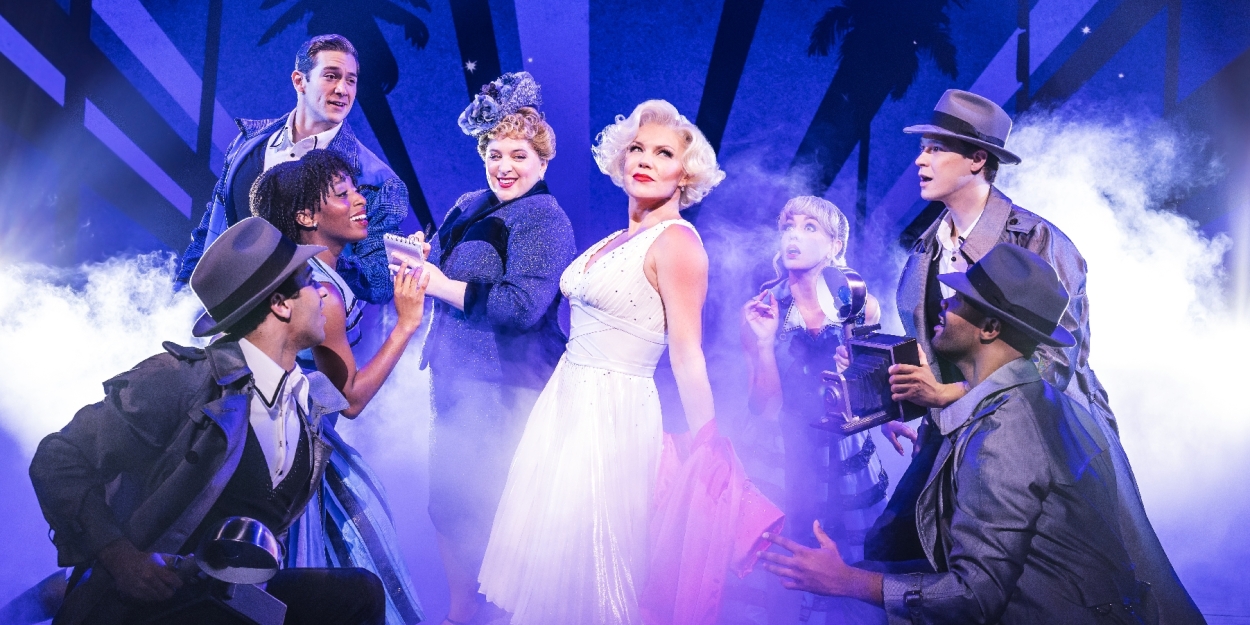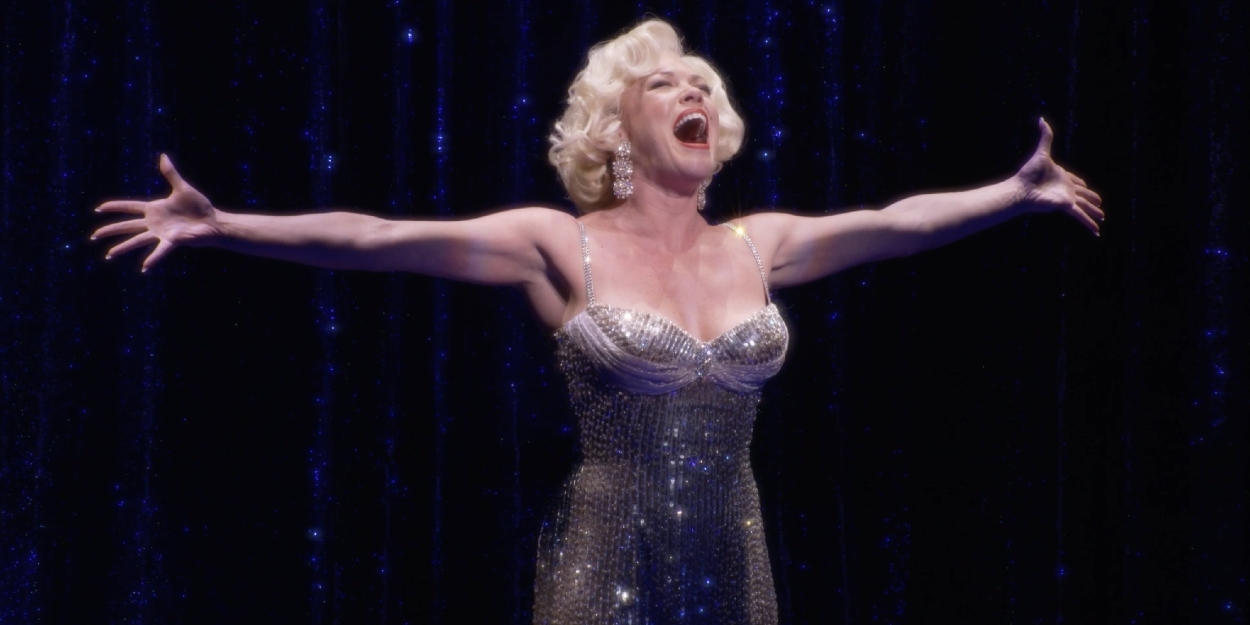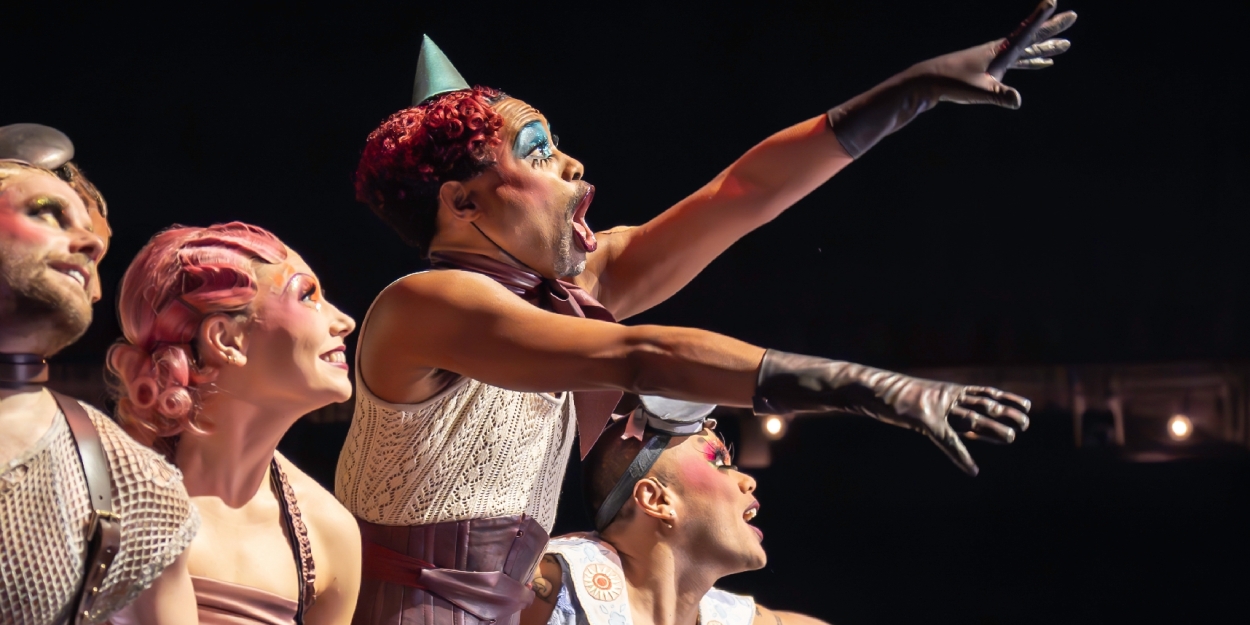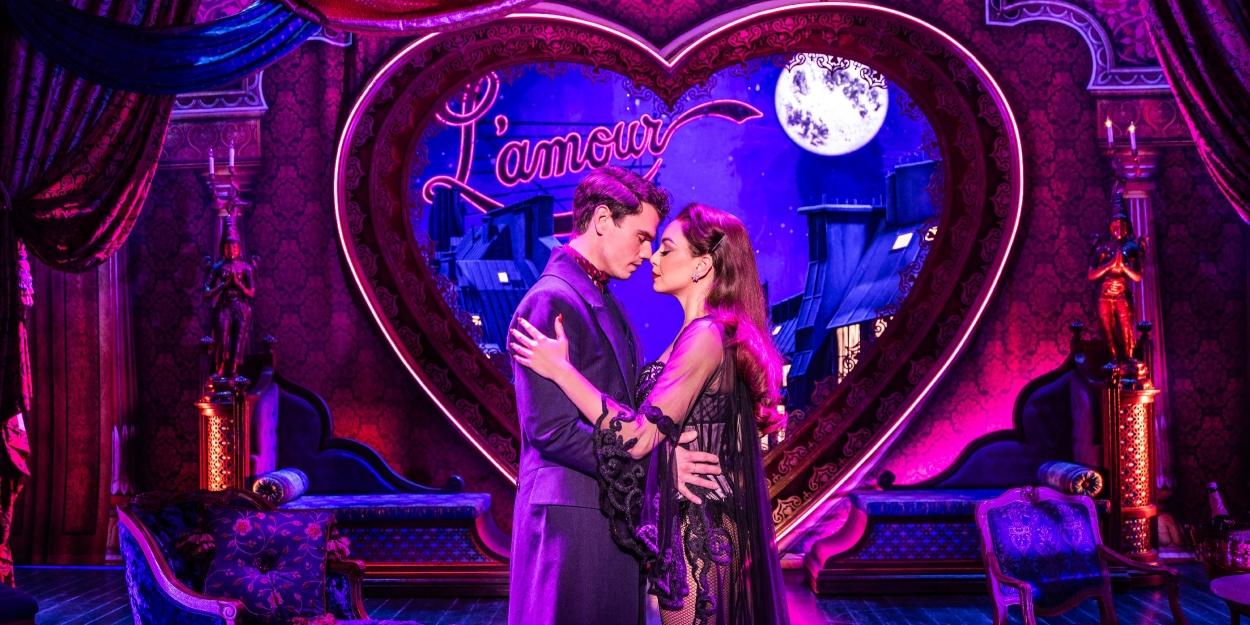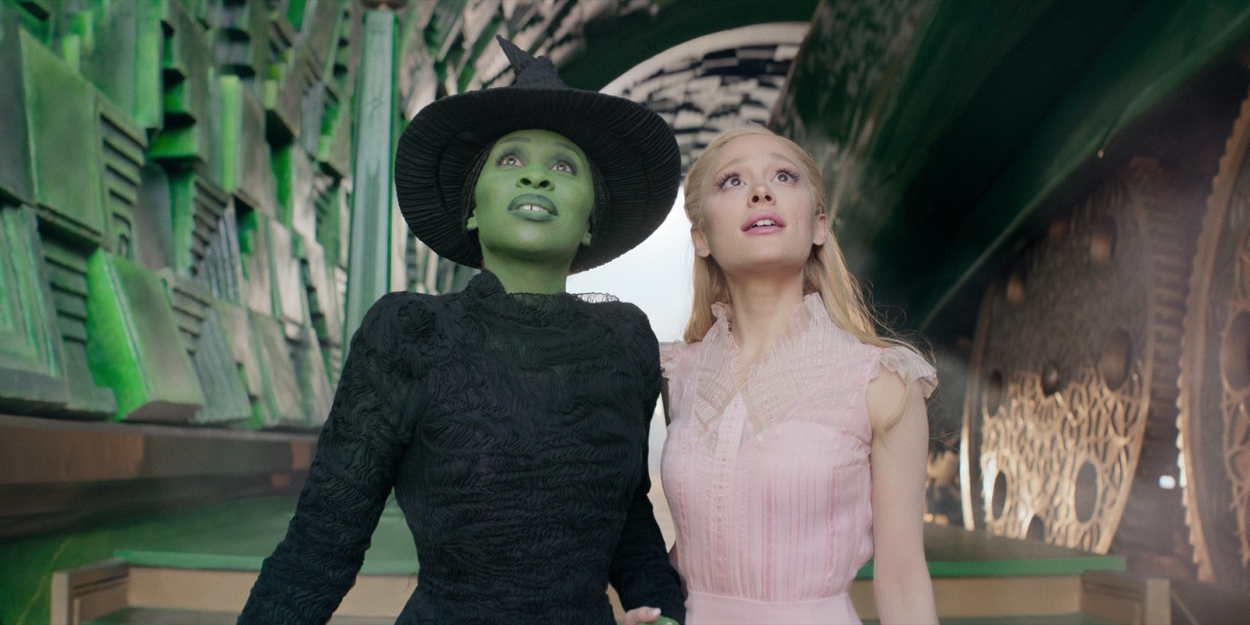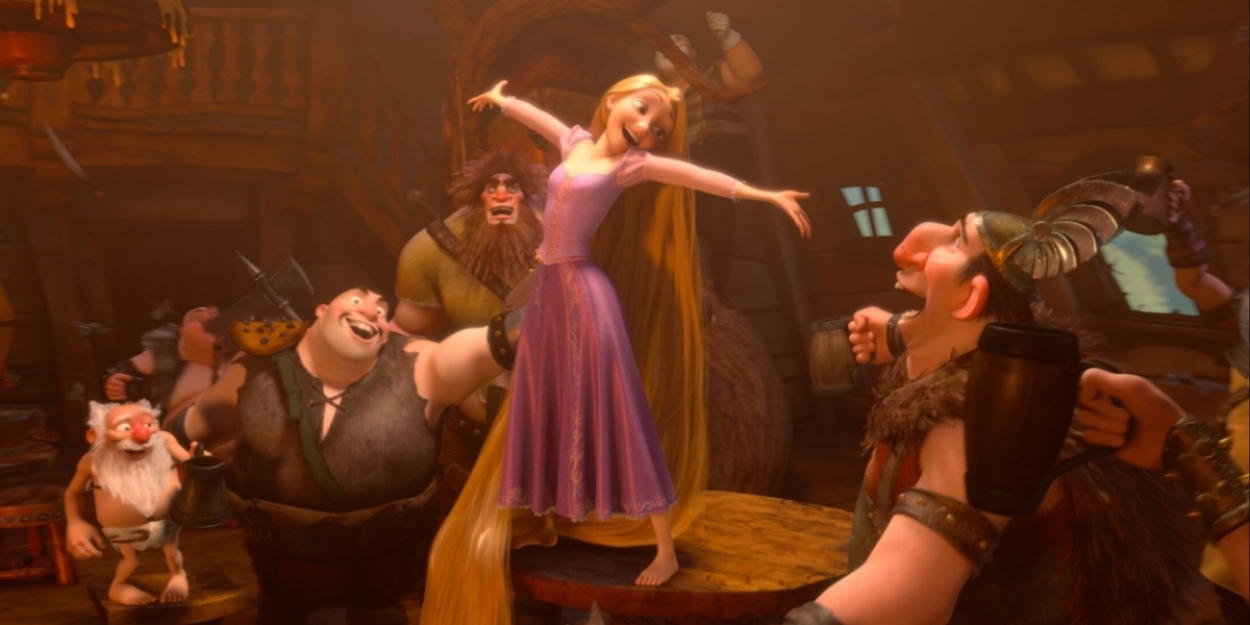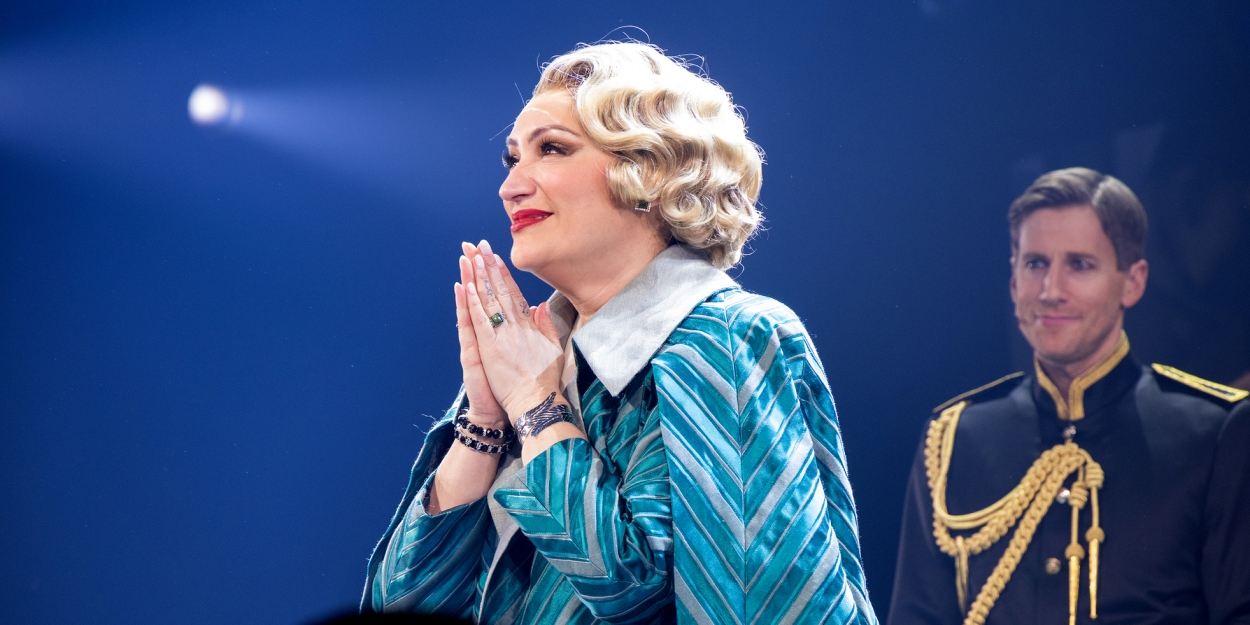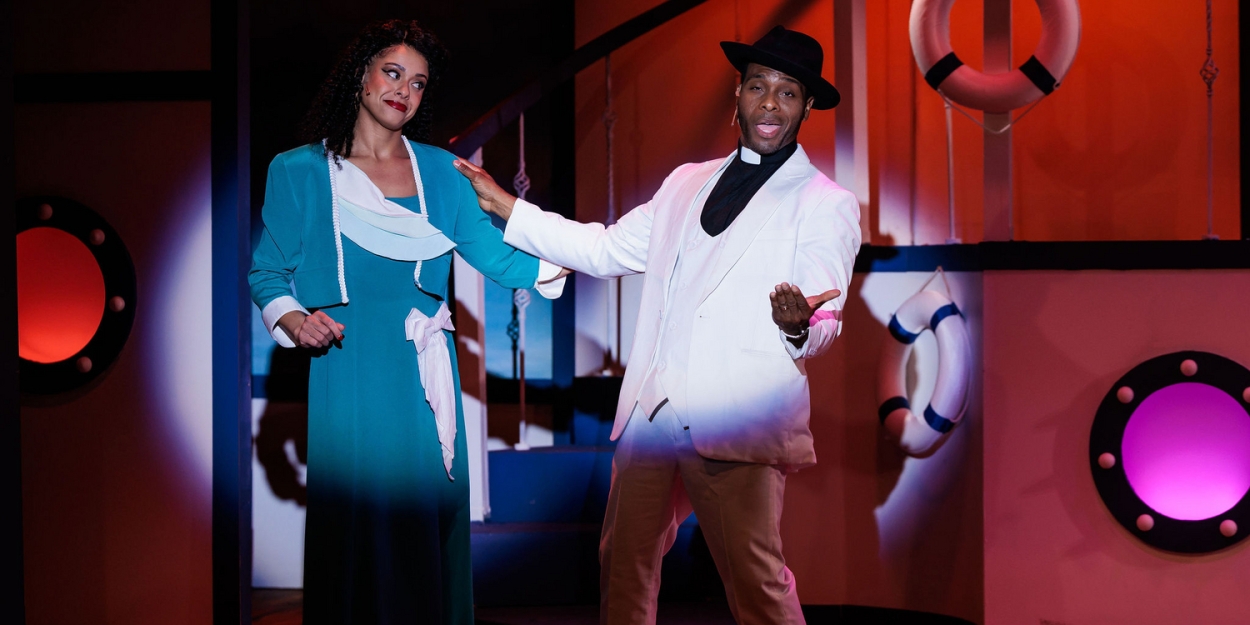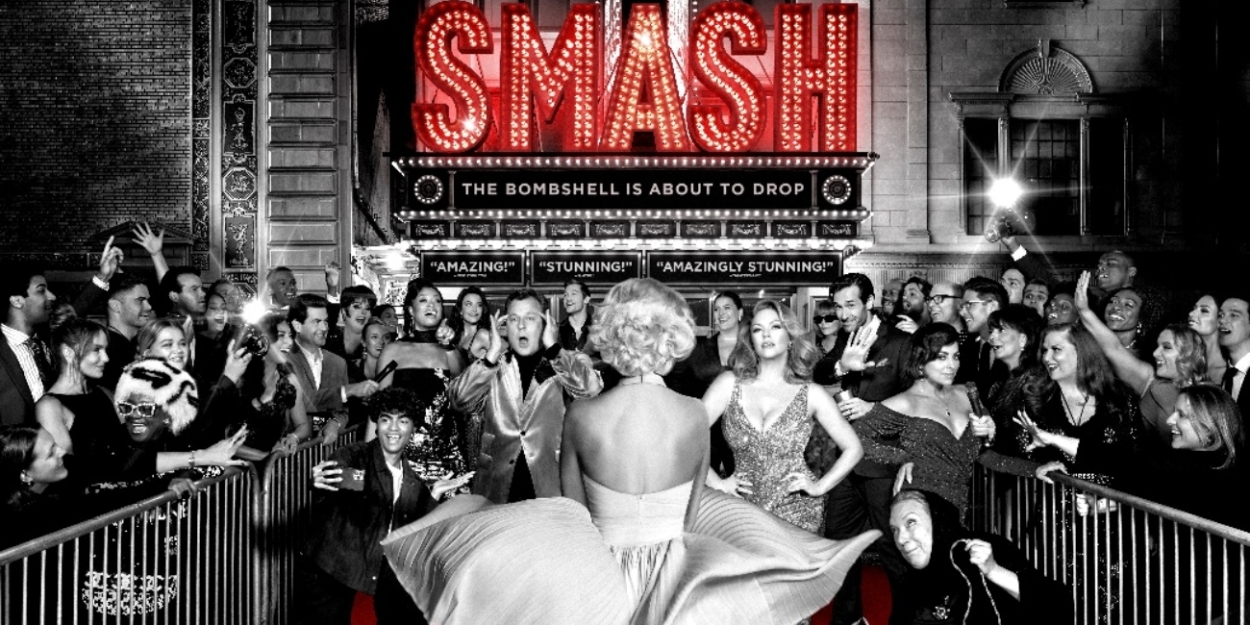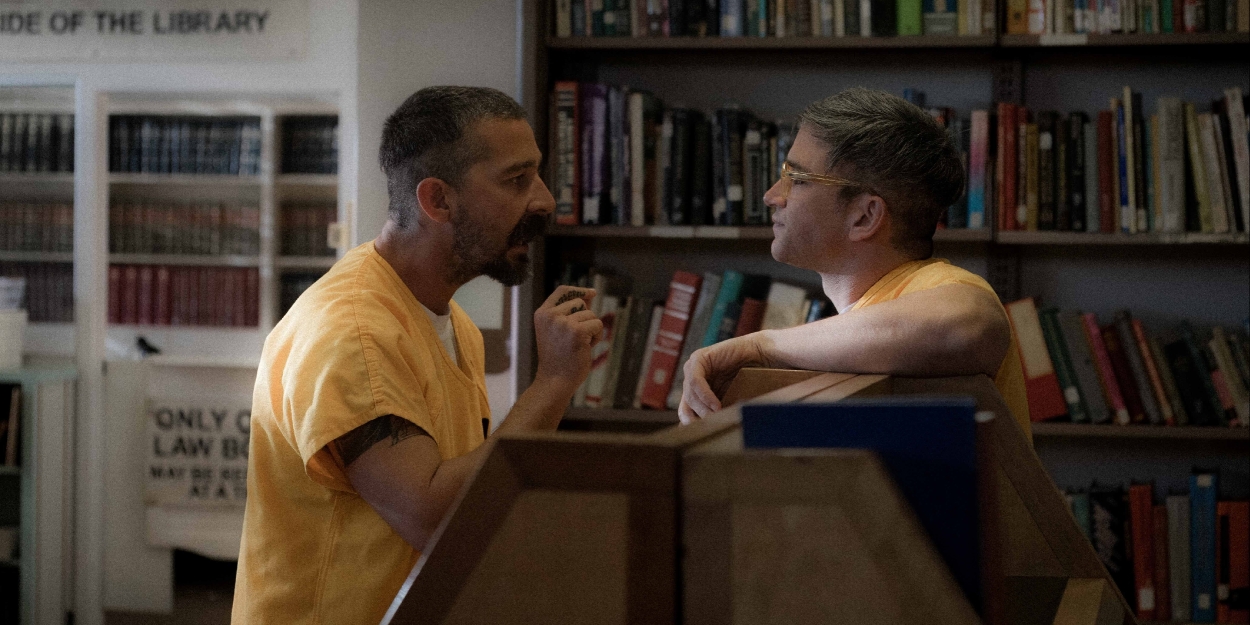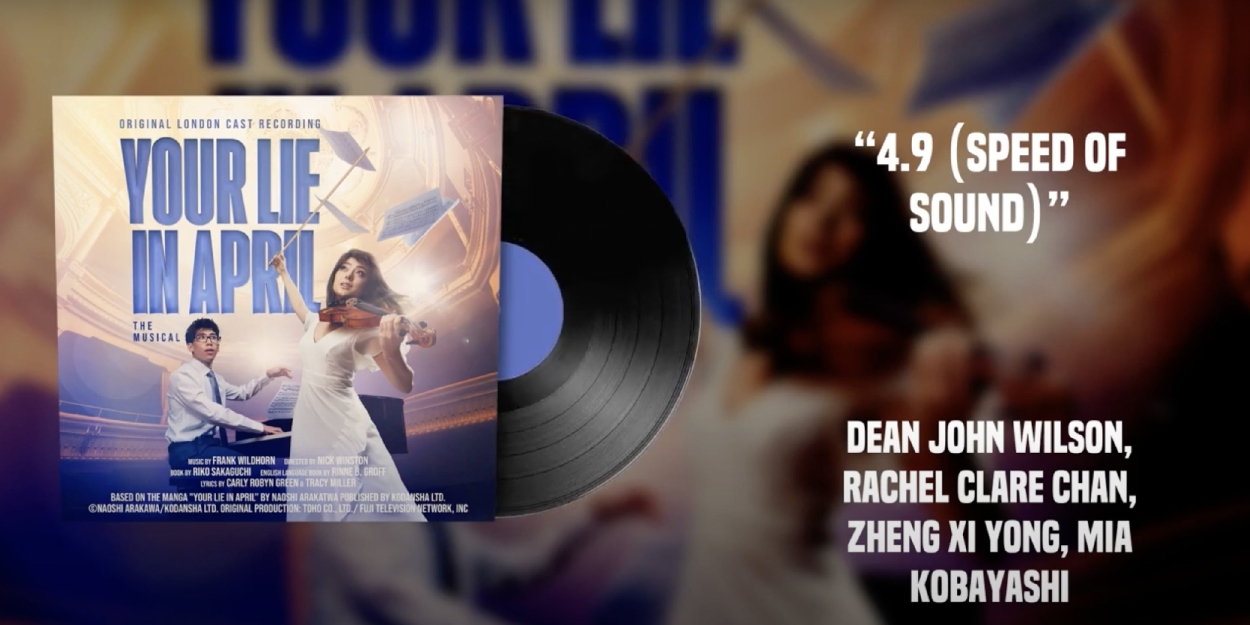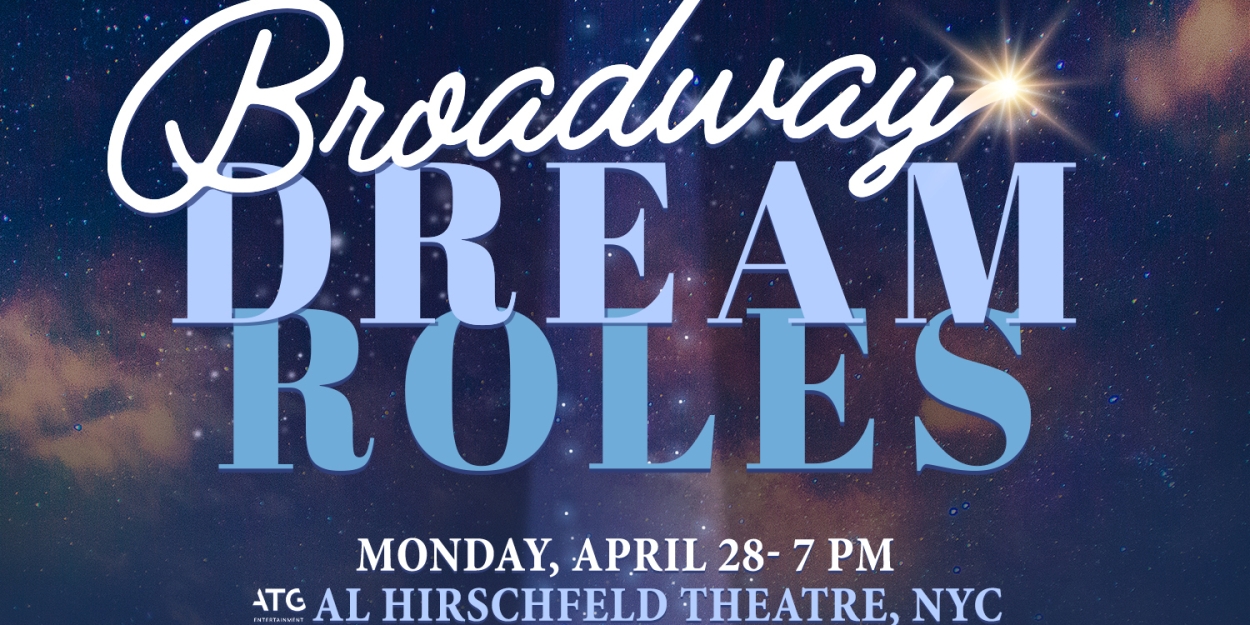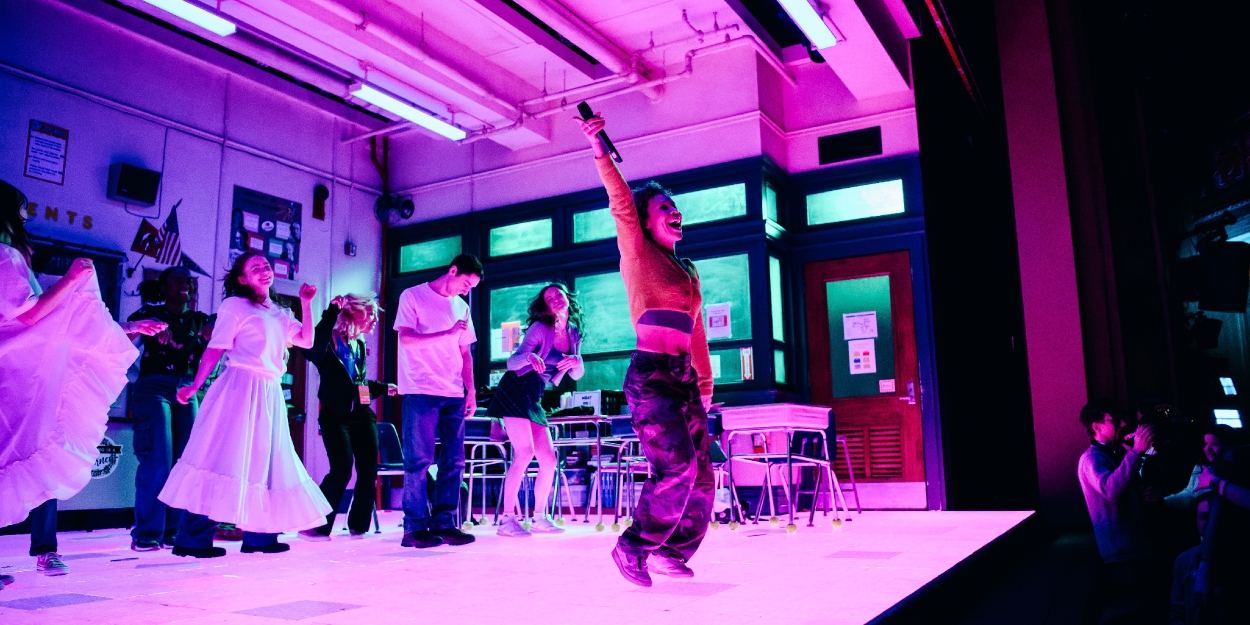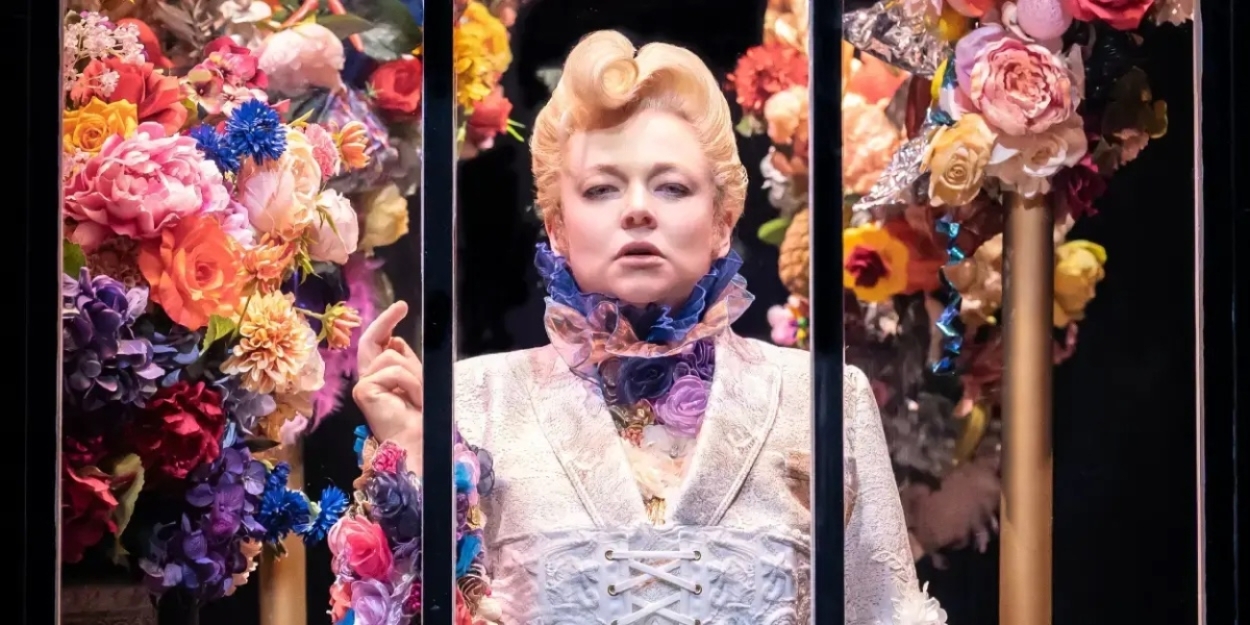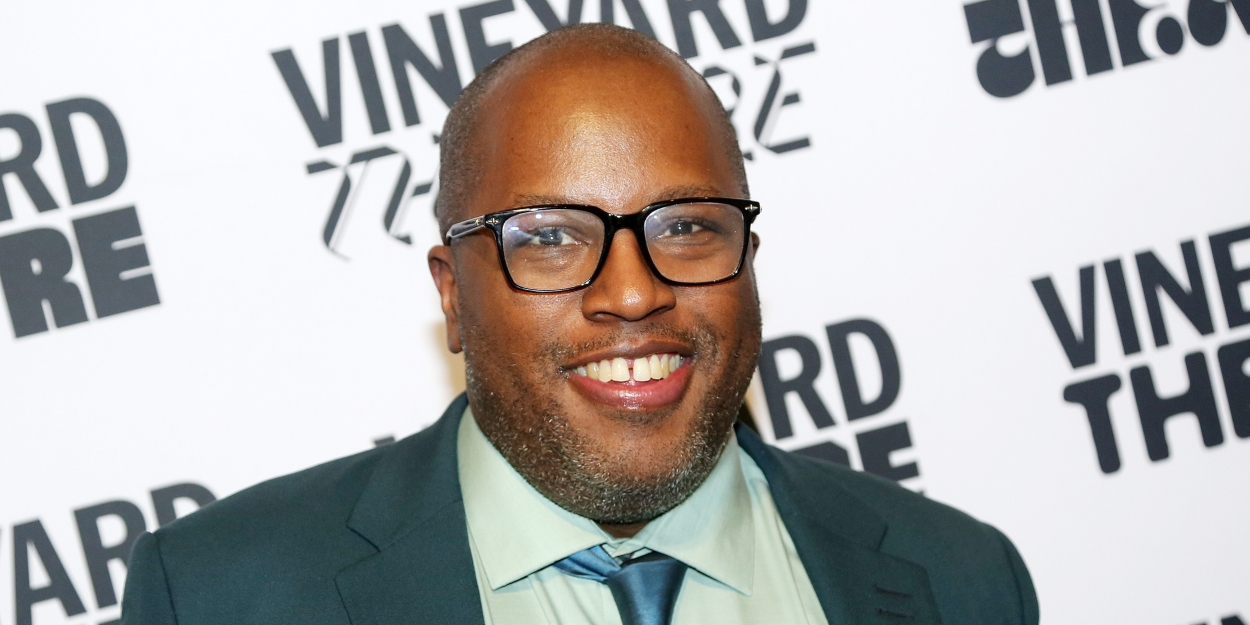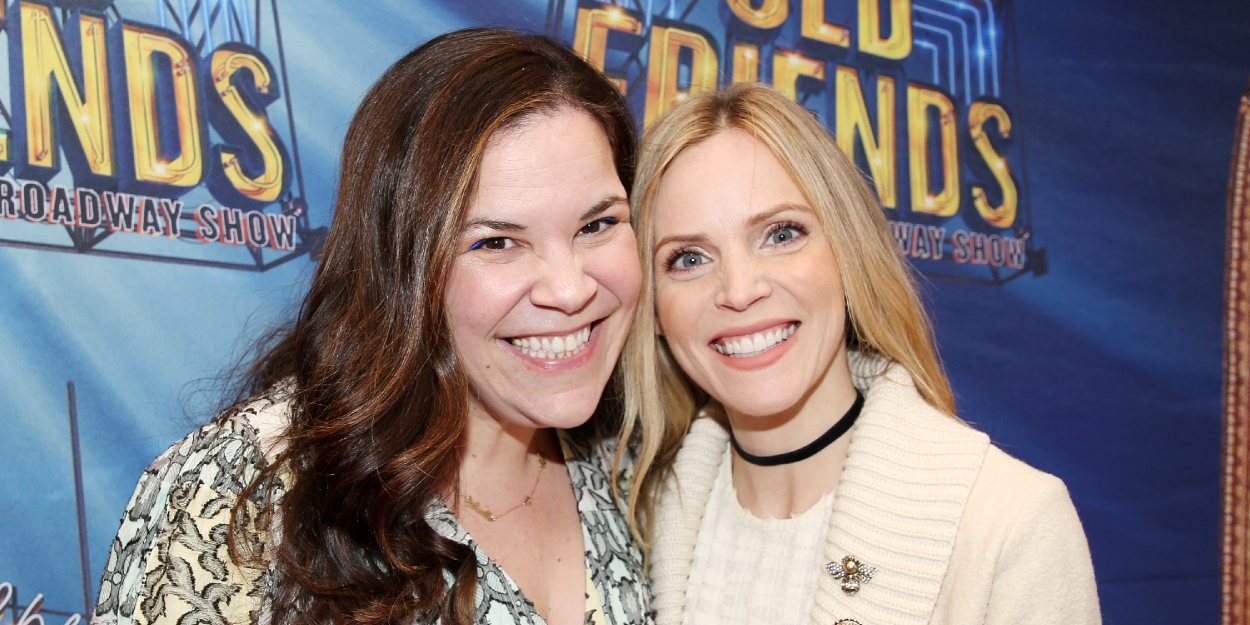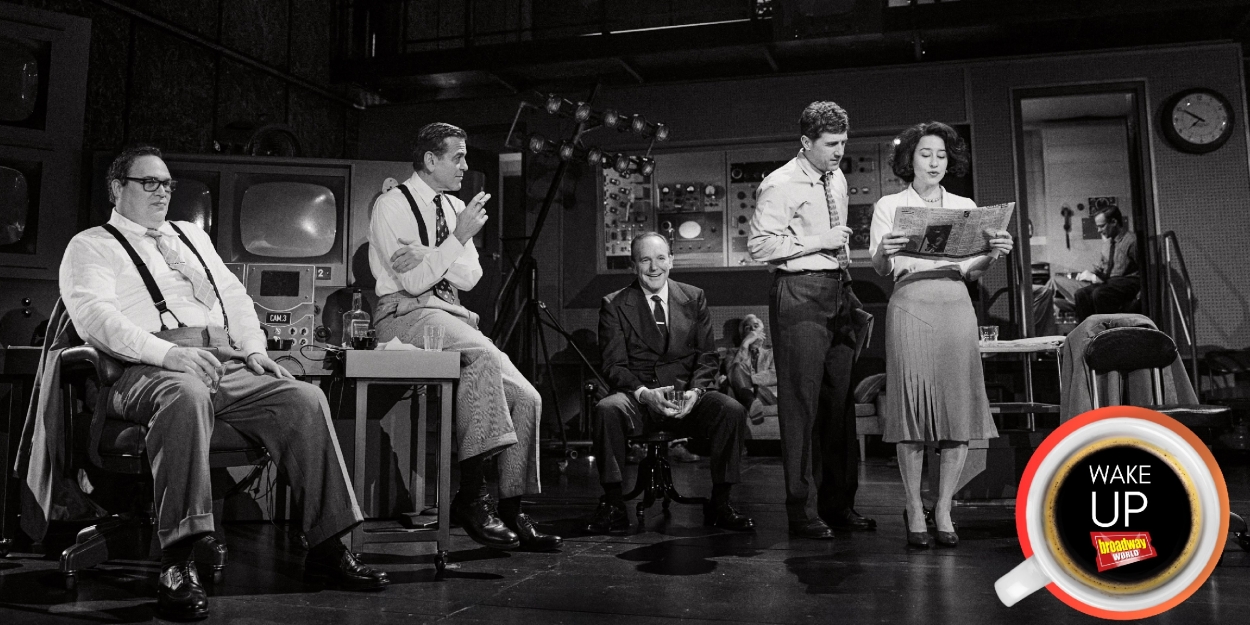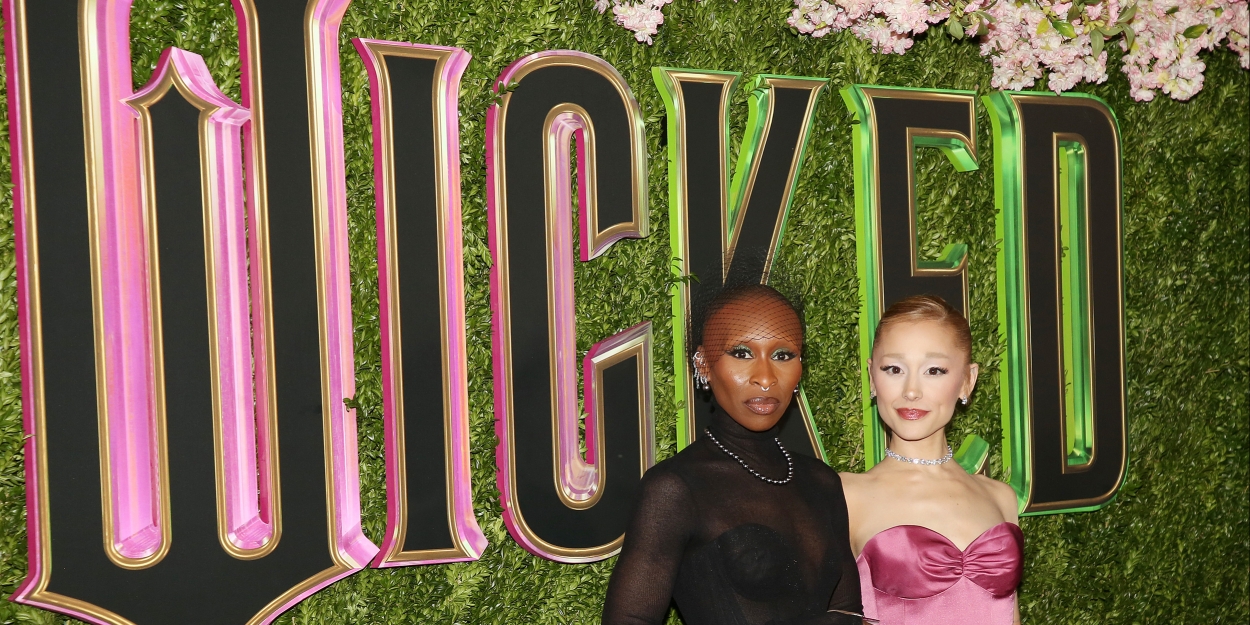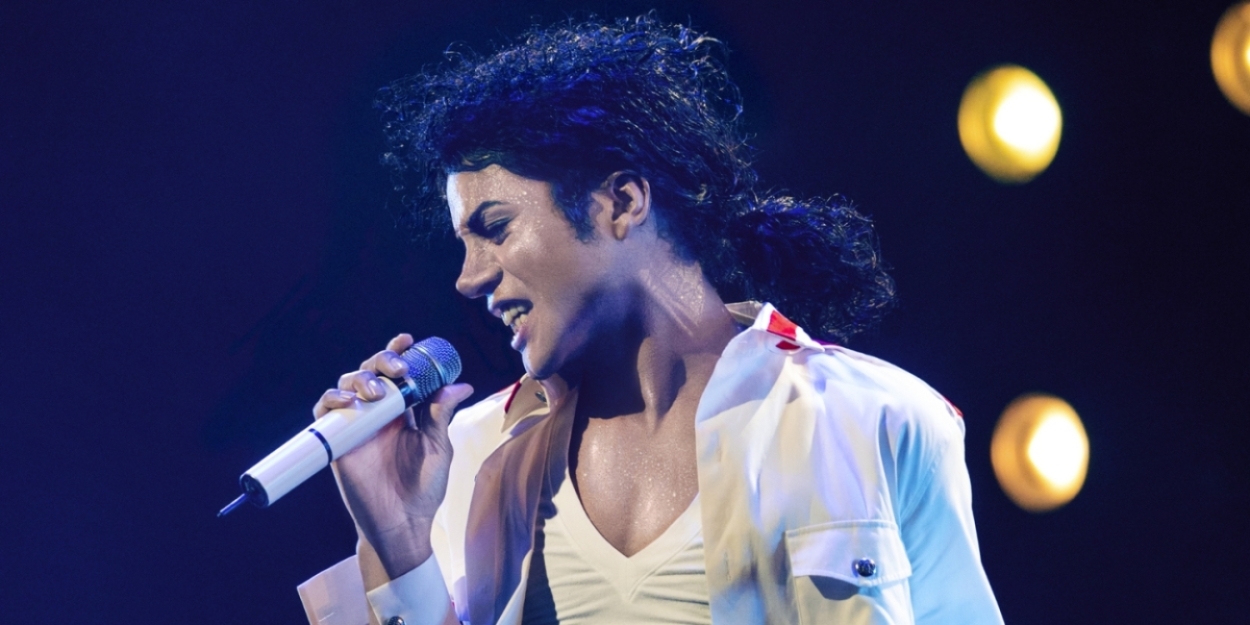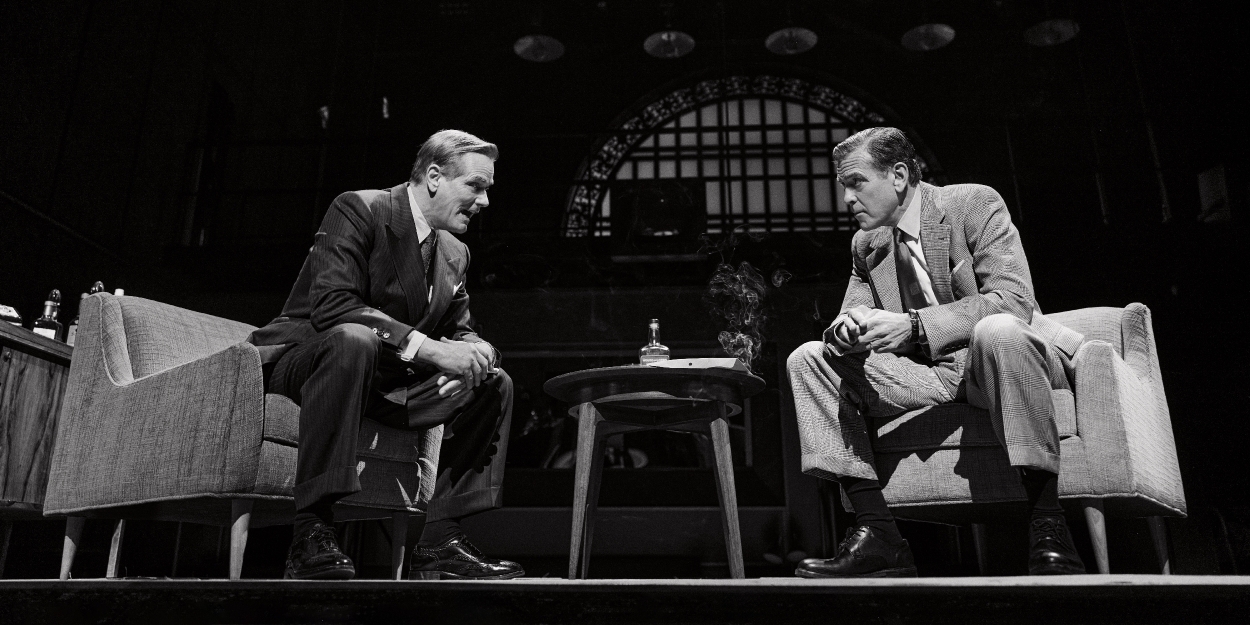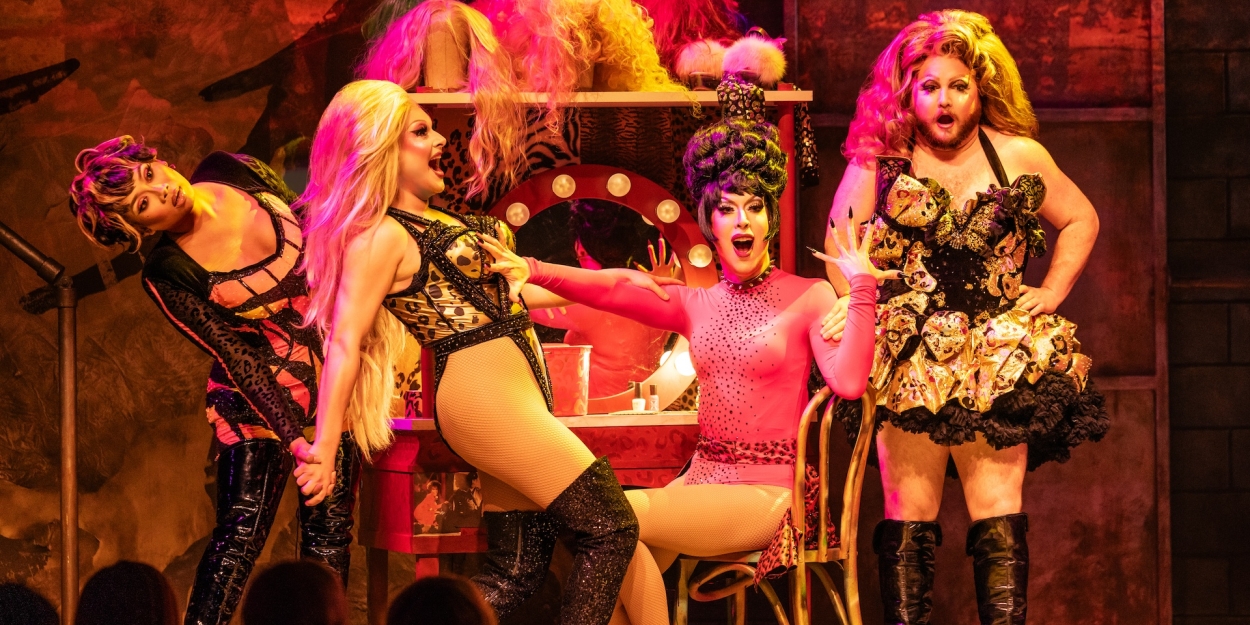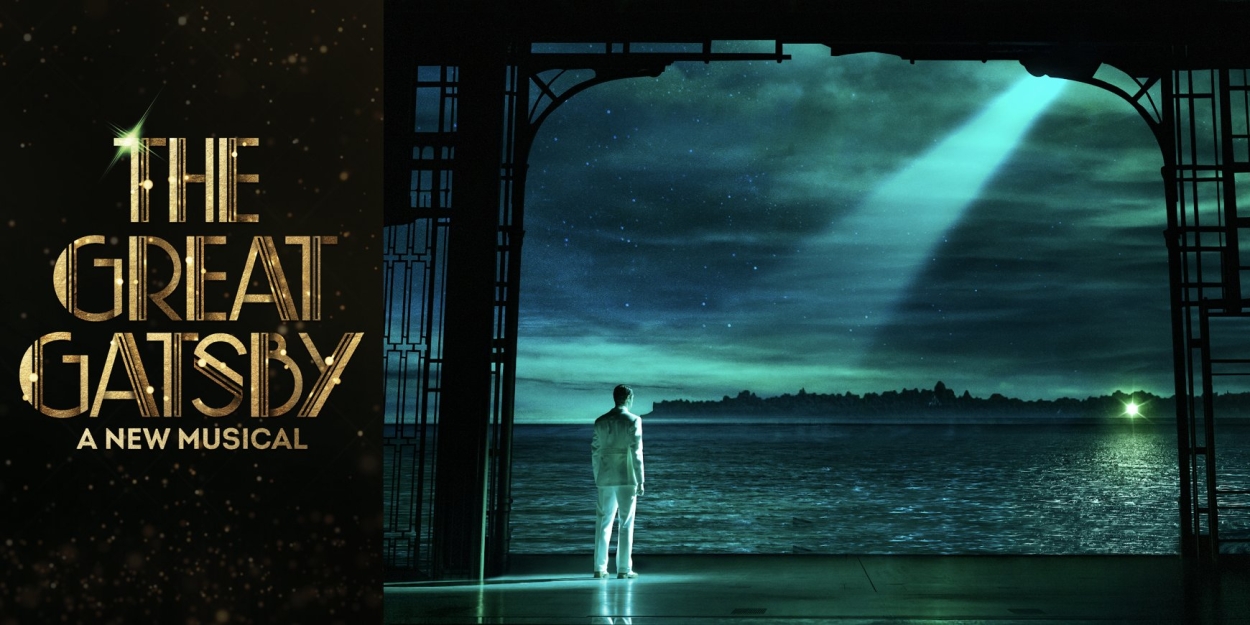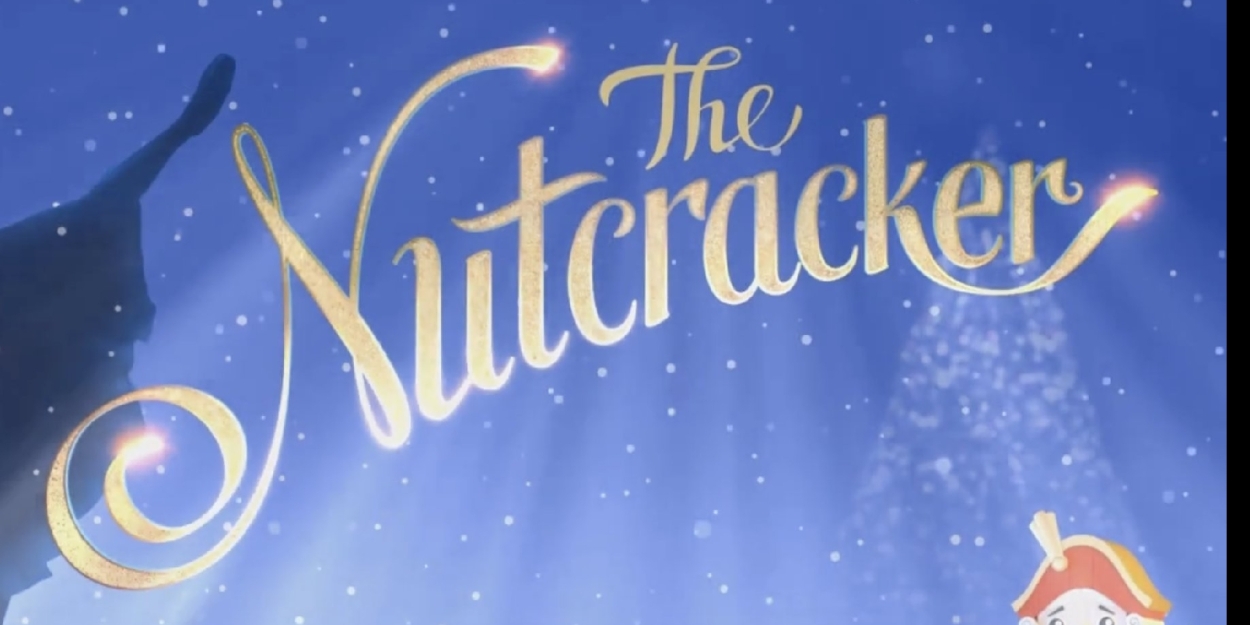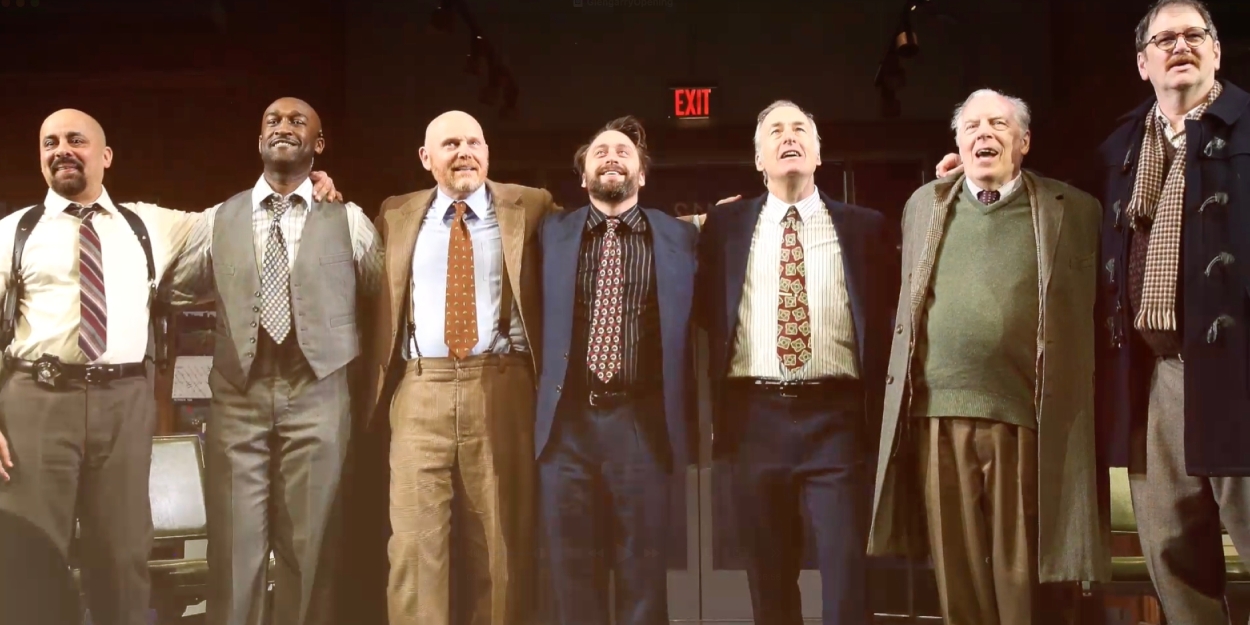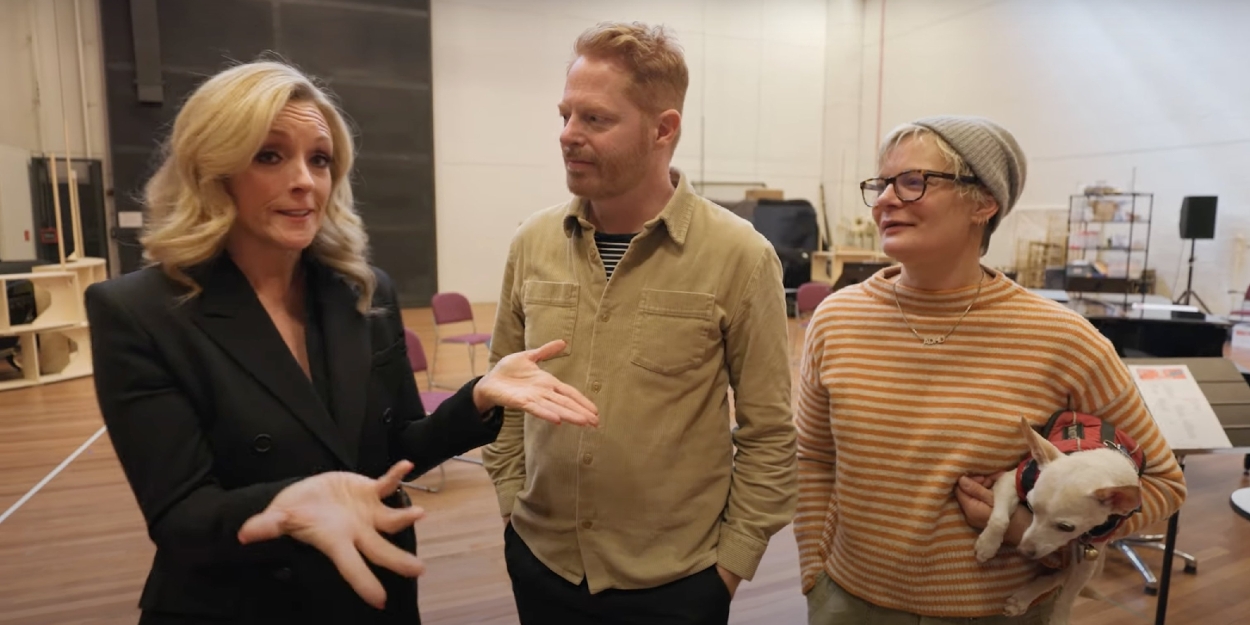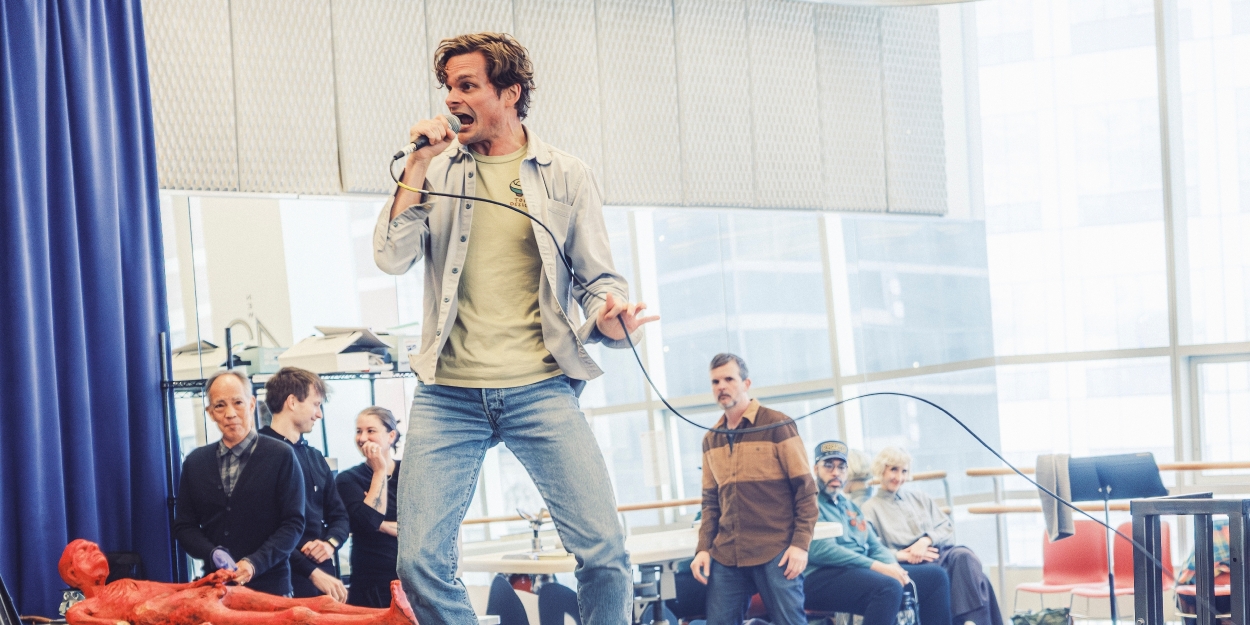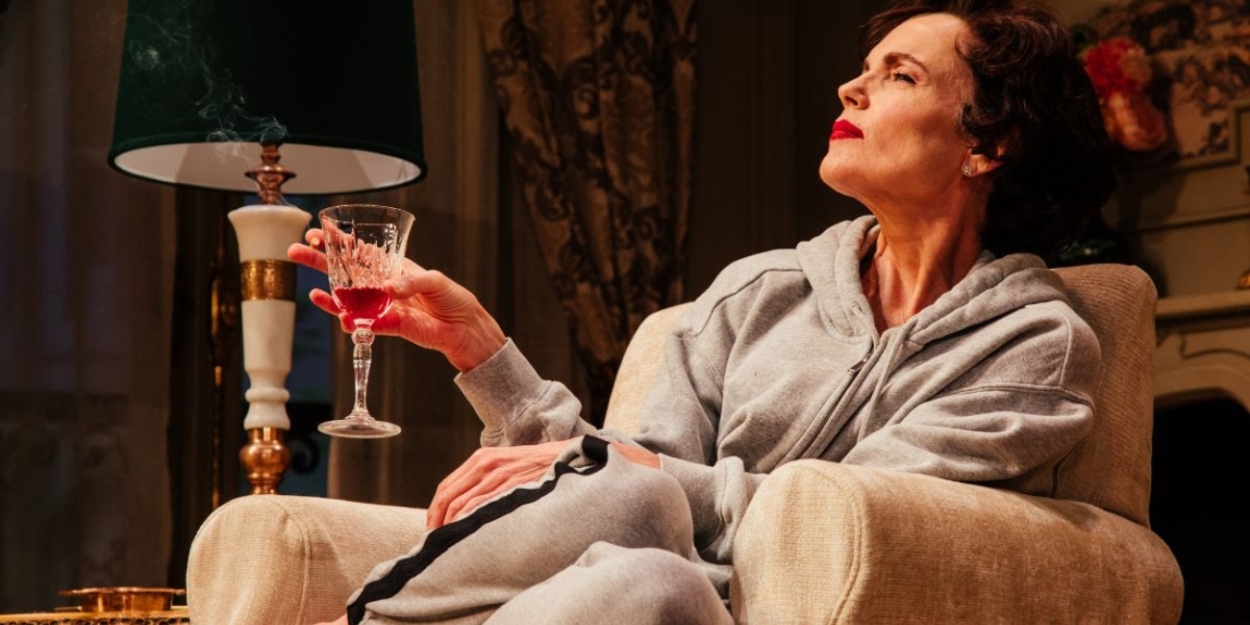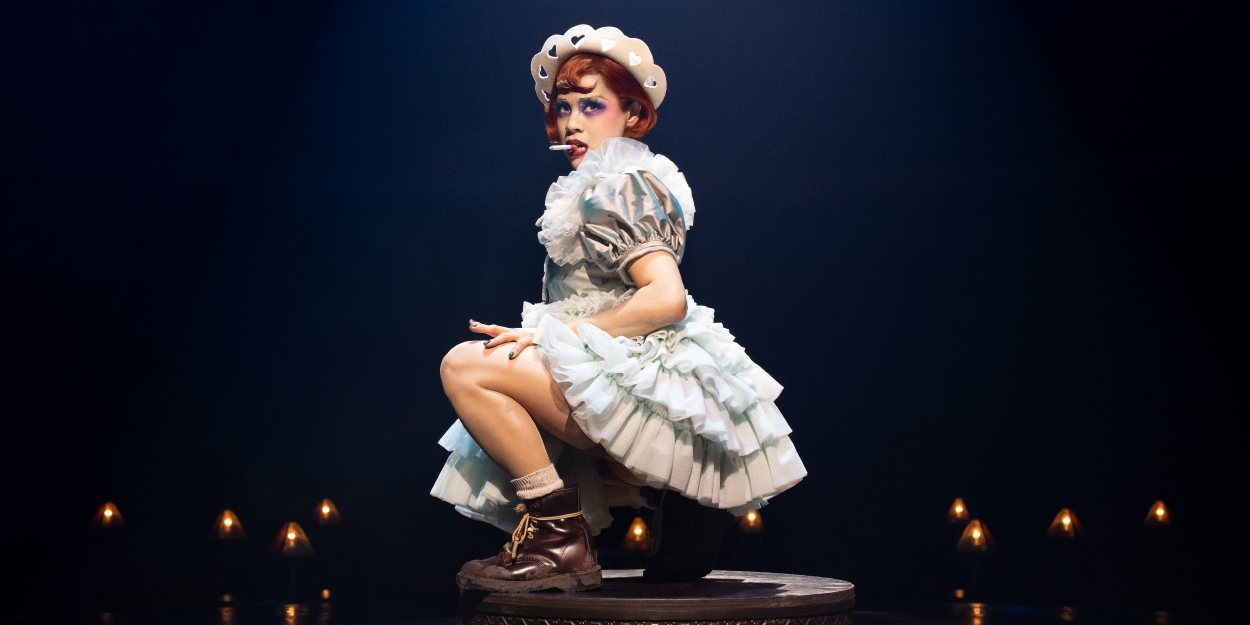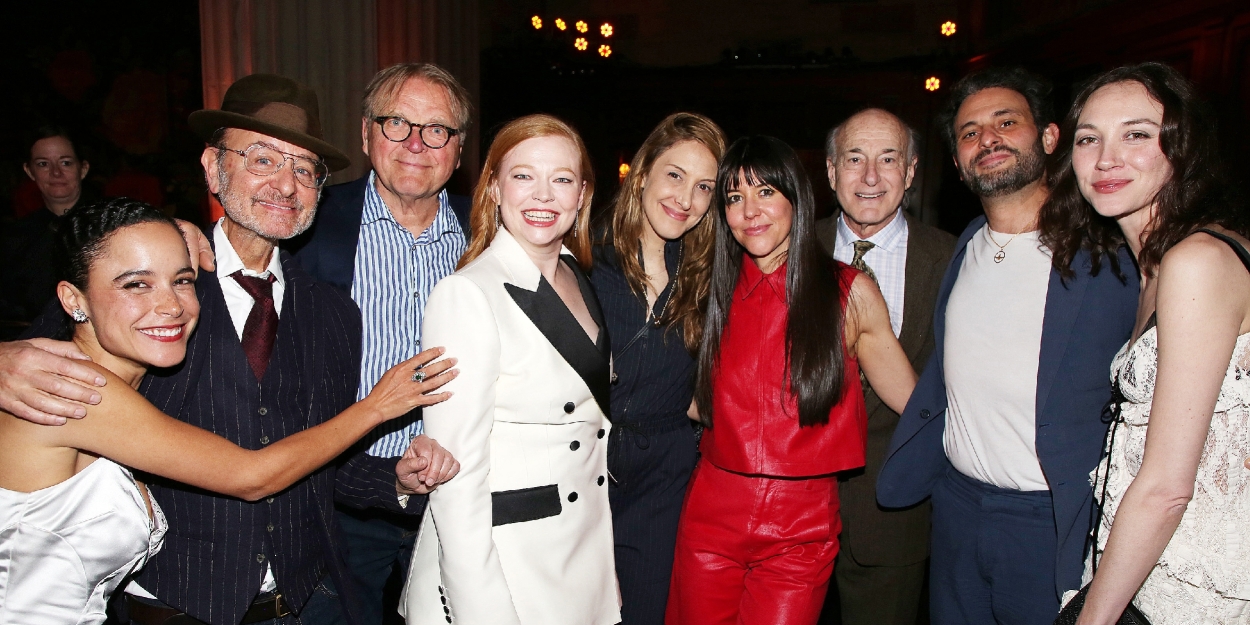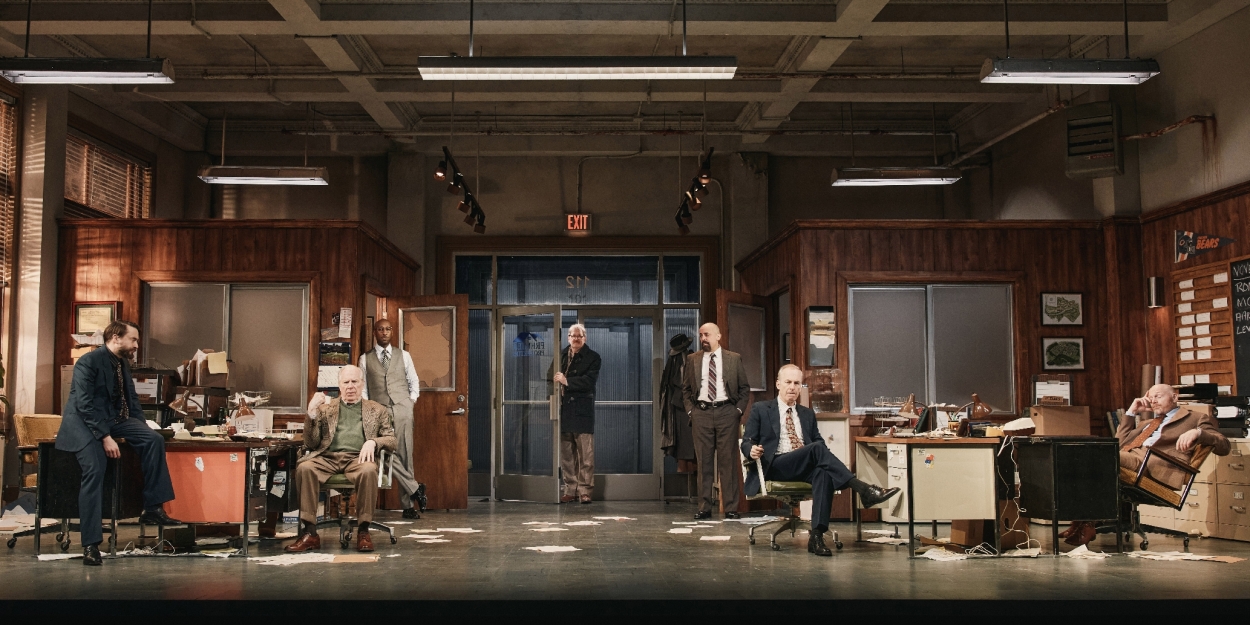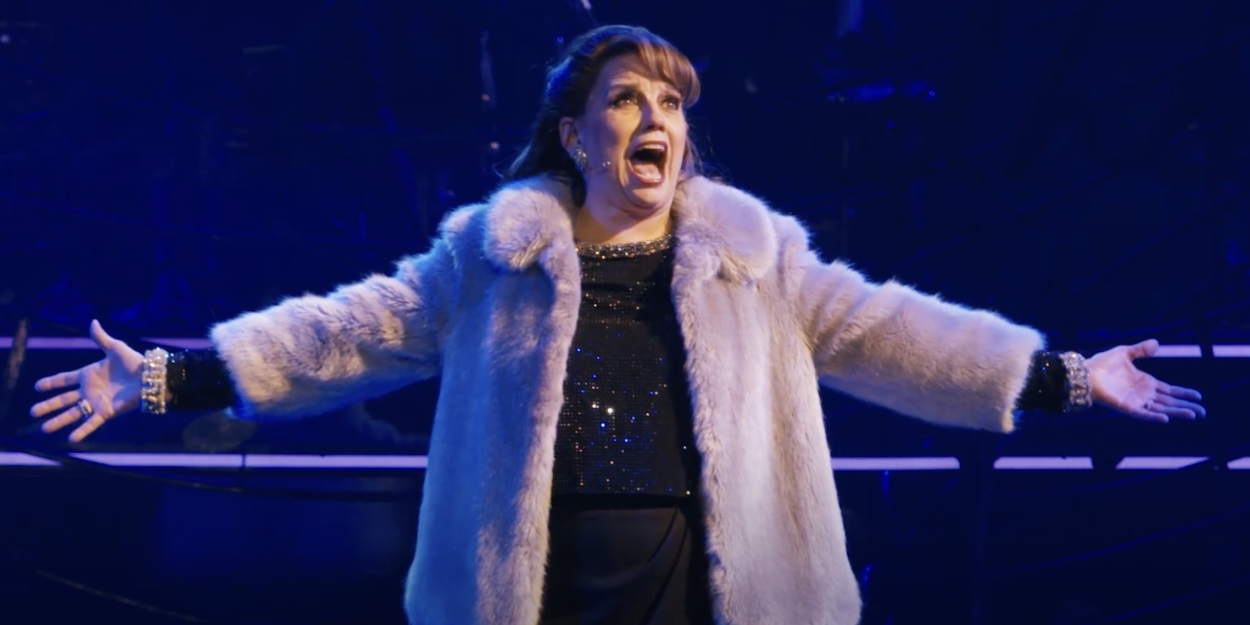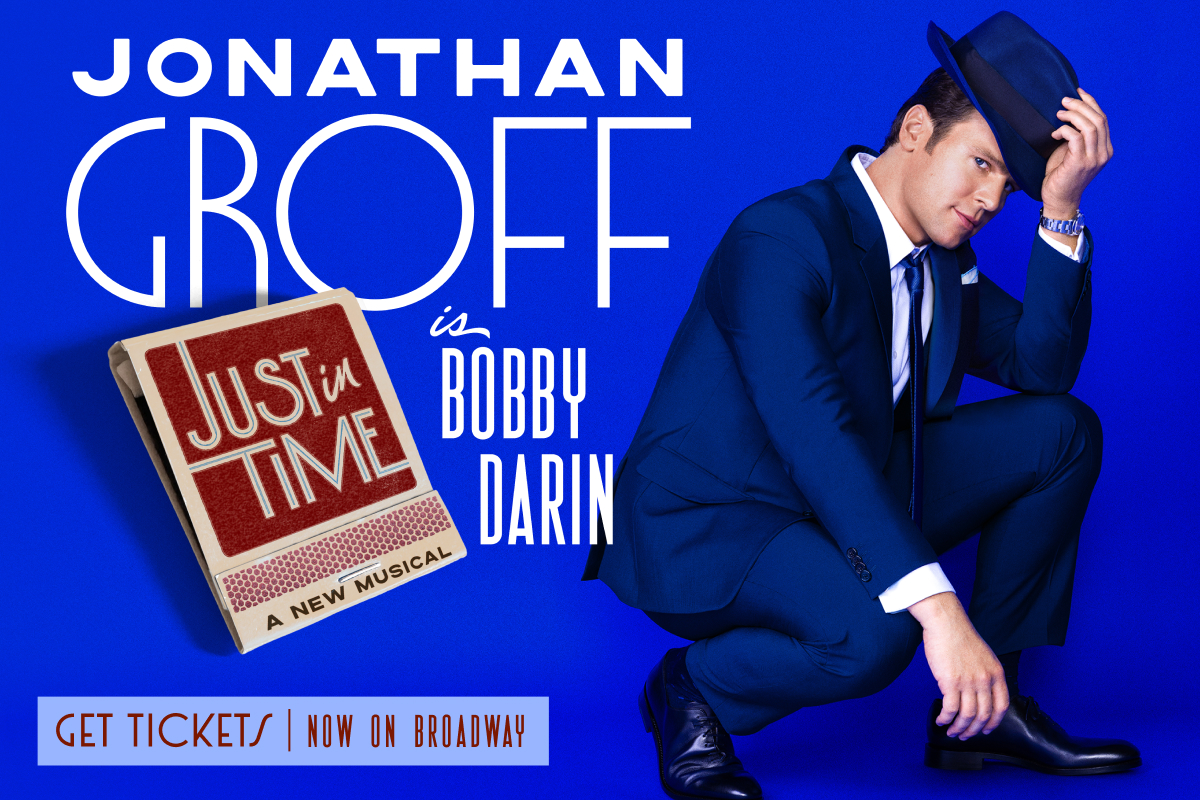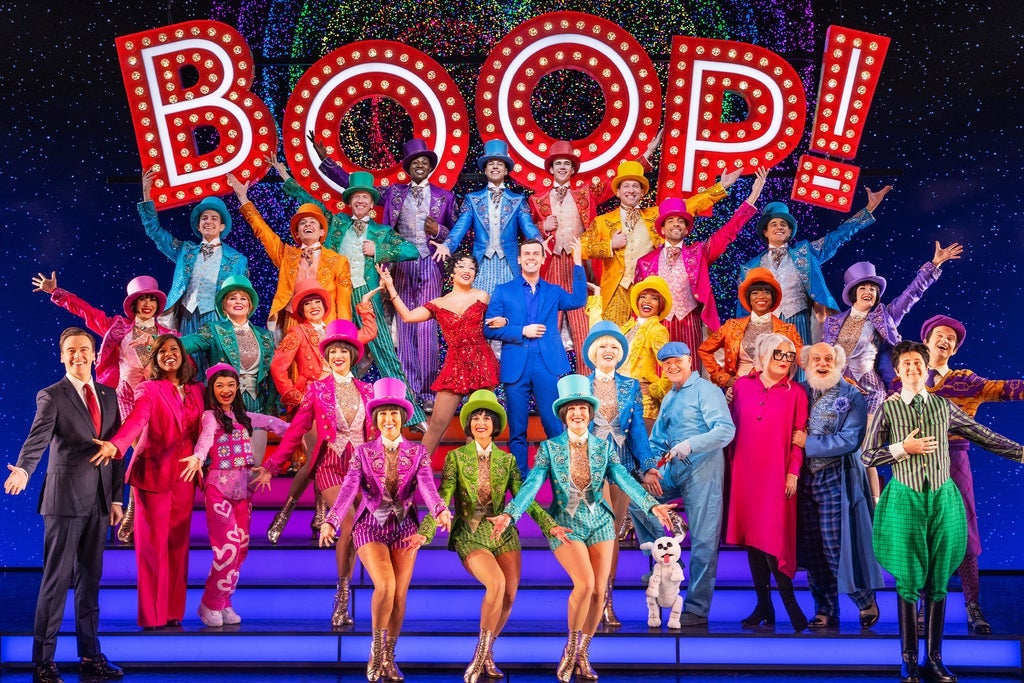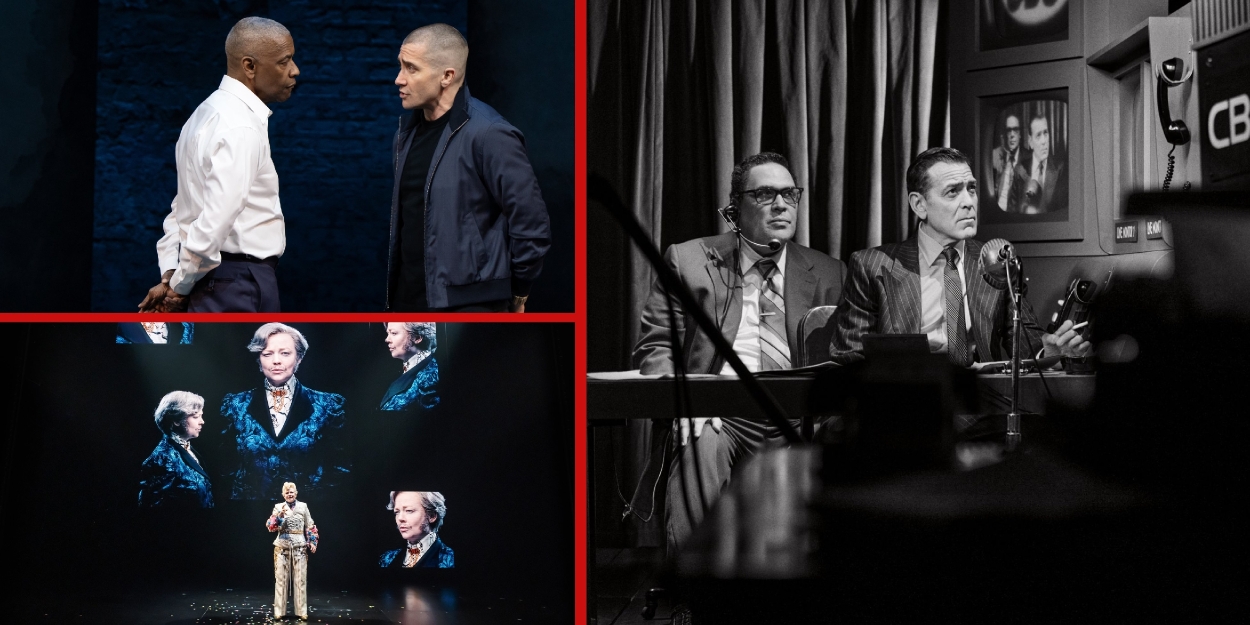- Photos: SMASH On Broadway - First Look
- Video: Watch Robyn Hurder Sing 'Don't Forget Me' in SMASH on Broadway
- Video: Billy Porter Explains Why 'the Emcee' Was a Role Worth Waiting For
Latest News
Trending Stories
Recommended for You
Photos: First Look At Orville Peck and Eva Noblezada In CABARET AT THE KIT KAT CLUB
Peck and Noblezada will star in the Tony Award-winning production for a limited 16-week engagement through Sunday, July 20.
Exclusive: Inside THE PICTURE OF DORIAN GRAY Opening Night Party
The production opened on March 27 at the Music Box Theatre.
Review Roundup: Starry GLENGARRY GLEN ROSS Revival Opens On Broadway
David Mamet's Pulitzer Prize-winning drama comes to life in a brand-new production, directed by Tony and Olivier Award-winner Patrick Marber.
Video: Watch Highlights from STEPHEN SONDHEIM'S OLD FRIENDS on Broadway
Stephen Sondheim's Old Friends will open on Wednesday, April 8.
Ticket Central
Hot Photos this week
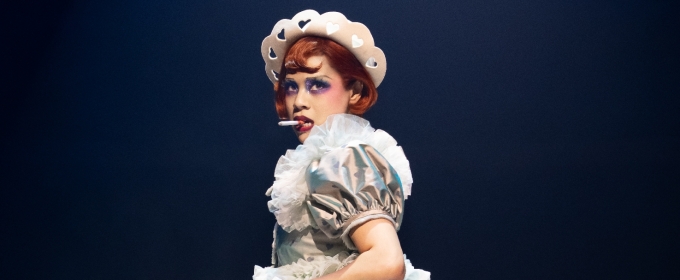 First Look At Orville Peck and Eva Noblezada In CABARET AT THE KIT KAT CLUB
Peck and Noblezada will star in the Tony Award-winning production for a limited 16-week engagement through Sunday, July 20.
First Look At Orville Peck and Eva Noblezada In CABARET AT THE KIT KAT CLUB
Peck and Noblezada will star in the Tony Award-winning production for a limited 16-week engagement through Sunday, July 20.
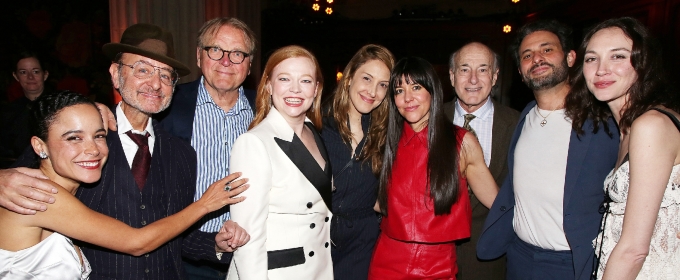 Exclusive: Inside THE PICTURE OF DORIAN GRAY Opening Night Party
The production opened on March 27 at the Music Box Theatre.
Exclusive: Inside THE PICTURE OF DORIAN GRAY Opening Night Party
The production opened on March 27 at the Music Box Theatre.
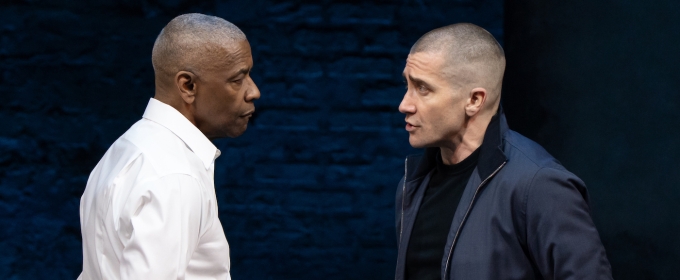 OTHELLO On Broadway Starring Denzel Washington and Jake Gyllenhaal
Othello will open Sunday, March 23 for a strictly limited engagement through Sunday, June 8 only at the Barrymore Theatre.
OTHELLO On Broadway Starring Denzel Washington and Jake Gyllenhaal
Othello will open Sunday, March 23 for a strictly limited engagement through Sunday, June 8 only at the Barrymore Theatre.
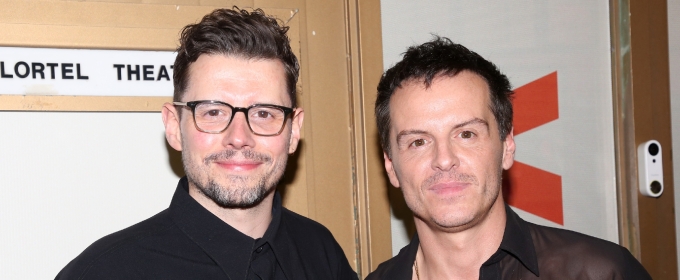 Andrew Scott and More on the VANYA Red Carpet
See photos of Antoni Porowski, Cole Escola, Noah Galvin and Ben Platt and more.
Andrew Scott and More on the VANYA Red Carpet
See photos of Antoni Porowski, Cole Escola, Noah Galvin and Ben Platt and more.
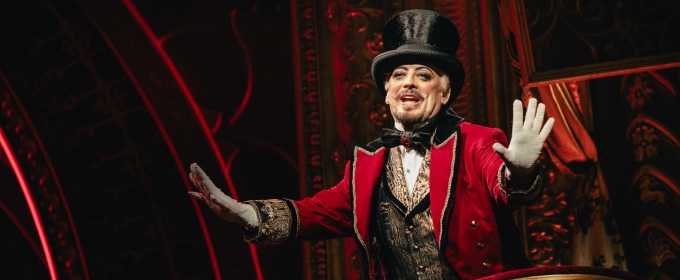 Boy George Returns to MOULIN ROUGE! on Broadway
Boy George will play a limited 10-week engagement through Sunday, May 25.
Boy George Returns to MOULIN ROUGE! on Broadway
Boy George will play a limited 10-week engagement through Sunday, May 25.
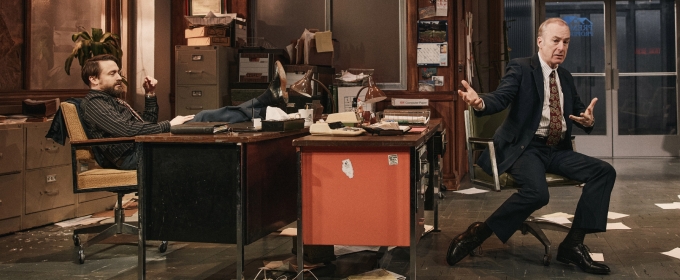 GLENGARRY GLEN ROSS On Broadway
The cast also includes Michael Mckean, Donald Webber, Jr., Howard W. Overshown, and John Pirruccello.
GLENGARRY GLEN ROSS On Broadway
The cast also includes Michael Mckean, Donald Webber, Jr., Howard W. Overshown, and John Pirruccello.
 Exclusive: Inside THE PICTURE OF DORIAN GRAY Opening Night Party
The production opened on March 27 at the Music Box Theatre.
Exclusive: Inside THE PICTURE OF DORIAN GRAY Opening Night Party
The production opened on March 27 at the Music Box Theatre.
 OTHELLO On Broadway Starring Denzel Washington and Jake Gyllenhaal
Othello will open Sunday, March 23 for a strictly limited engagement through Sunday, June 8 only at the Barrymore Theatre.
OTHELLO On Broadway Starring Denzel Washington and Jake Gyllenhaal
Othello will open Sunday, March 23 for a strictly limited engagement through Sunday, June 8 only at the Barrymore Theatre.
 Andrew Scott and More on the VANYA Red Carpet
See photos of Antoni Porowski, Cole Escola, Noah Galvin and Ben Platt and more.
Andrew Scott and More on the VANYA Red Carpet
See photos of Antoni Porowski, Cole Escola, Noah Galvin and Ben Platt and more.
 Boy George Returns to MOULIN ROUGE! on Broadway
Boy George will play a limited 10-week engagement through Sunday, May 25.
Boy George Returns to MOULIN ROUGE! on Broadway
Boy George will play a limited 10-week engagement through Sunday, May 25.
 GLENGARRY GLEN ROSS On Broadway
The cast also includes Michael Mckean, Donald Webber, Jr., Howard W. Overshown, and John Pirruccello.
GLENGARRY GLEN ROSS On Broadway
The cast also includes Michael Mckean, Donald Webber, Jr., Howard W. Overshown, and John Pirruccello.
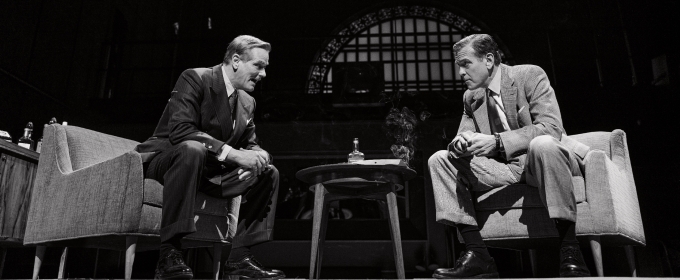 First Look at GOOD NIGHT, AND GOOD LUCK, Starring George Clooney
Good Night, and Good Luck will open at the Winter Garden Theatre on April 3.
First Look at GOOD NIGHT, AND GOOD LUCK, Starring George Clooney
Good Night, and Good Luck will open at the Winter Garden Theatre on April 3.
 OTHELLO On Broadway Starring Denzel Washington and Jake Gyllenhaal
Othello will open Sunday, March 23 for a strictly limited engagement through Sunday, June 8 only at the Barrymore Theatre.
OTHELLO On Broadway Starring Denzel Washington and Jake Gyllenhaal
Othello will open Sunday, March 23 for a strictly limited engagement through Sunday, June 8 only at the Barrymore Theatre.
 Andrew Scott and More on the VANYA Red Carpet
See photos of Antoni Porowski, Cole Escola, Noah Galvin and Ben Platt and more.
Andrew Scott and More on the VANYA Red Carpet
See photos of Antoni Porowski, Cole Escola, Noah Galvin and Ben Platt and more.
 Boy George Returns to MOULIN ROUGE! on Broadway
Boy George will play a limited 10-week engagement through Sunday, May 25.
Boy George Returns to MOULIN ROUGE! on Broadway
Boy George will play a limited 10-week engagement through Sunday, May 25.
 GLENGARRY GLEN ROSS On Broadway
The cast also includes Michael Mckean, Donald Webber, Jr., Howard W. Overshown, and John Pirruccello.
GLENGARRY GLEN ROSS On Broadway
The cast also includes Michael Mckean, Donald Webber, Jr., Howard W. Overshown, and John Pirruccello.
 First Look at GOOD NIGHT, AND GOOD LUCK, Starring George Clooney
Good Night, and Good Luck will open at the Winter Garden Theatre on April 3.
First Look at GOOD NIGHT, AND GOOD LUCK, Starring George Clooney
Good Night, and Good Luck will open at the Winter Garden Theatre on April 3.
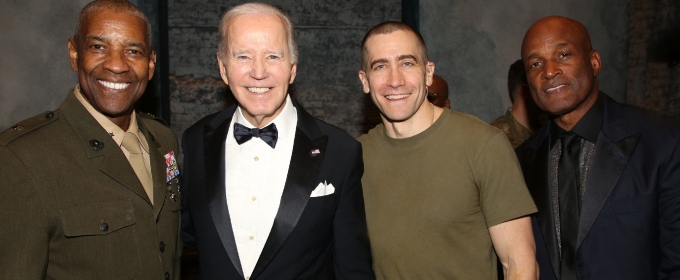 OTHELLO on Broadway Welcomes Joe and Jill Biden for A Backstage Visit
The former President and First Lady stopped in for a visit with stars Denzel Washington, Jake Gyllenhaal, and more.
OTHELLO on Broadway Welcomes Joe and Jill Biden for A Backstage Visit
The former President and First Lady stopped in for a visit with stars Denzel Washington, Jake Gyllenhaal, and more.
 Andrew Scott and More on the VANYA Red Carpet
See photos of Antoni Porowski, Cole Escola, Noah Galvin and Ben Platt and more.
Andrew Scott and More on the VANYA Red Carpet
See photos of Antoni Porowski, Cole Escola, Noah Galvin and Ben Platt and more.
 Boy George Returns to MOULIN ROUGE! on Broadway
Boy George will play a limited 10-week engagement through Sunday, May 25.
Boy George Returns to MOULIN ROUGE! on Broadway
Boy George will play a limited 10-week engagement through Sunday, May 25.
 GLENGARRY GLEN ROSS On Broadway
The cast also includes Michael Mckean, Donald Webber, Jr., Howard W. Overshown, and John Pirruccello.
GLENGARRY GLEN ROSS On Broadway
The cast also includes Michael Mckean, Donald Webber, Jr., Howard W. Overshown, and John Pirruccello.
 First Look at GOOD NIGHT, AND GOOD LUCK, Starring George Clooney
Good Night, and Good Luck will open at the Winter Garden Theatre on April 3.
First Look at GOOD NIGHT, AND GOOD LUCK, Starring George Clooney
Good Night, and Good Luck will open at the Winter Garden Theatre on April 3.
 OTHELLO on Broadway Welcomes Joe and Jill Biden for A Backstage Visit
The former President and First Lady stopped in for a visit with stars Denzel Washington, Jake Gyllenhaal, and more.
OTHELLO on Broadway Welcomes Joe and Jill Biden for A Backstage Visit
The former President and First Lady stopped in for a visit with stars Denzel Washington, Jake Gyllenhaal, and more.
 THE OUTSIDERS on Broadway New Images
The current cast features Daryl Tofa as Two-Bit Mathews, Brody Grant as Ponyboy Curtis and more.
THE OUTSIDERS on Broadway New Images
The current cast features Daryl Tofa as Two-Bit Mathews, Brody Grant as Ponyboy Curtis and more.
 Boy George Returns to MOULIN ROUGE! on Broadway
Boy George will play a limited 10-week engagement through Sunday, May 25.
Boy George Returns to MOULIN ROUGE! on Broadway
Boy George will play a limited 10-week engagement through Sunday, May 25.
 GLENGARRY GLEN ROSS On Broadway
The cast also includes Michael Mckean, Donald Webber, Jr., Howard W. Overshown, and John Pirruccello.
GLENGARRY GLEN ROSS On Broadway
The cast also includes Michael Mckean, Donald Webber, Jr., Howard W. Overshown, and John Pirruccello.
 First Look at GOOD NIGHT, AND GOOD LUCK, Starring George Clooney
Good Night, and Good Luck will open at the Winter Garden Theatre on April 3.
First Look at GOOD NIGHT, AND GOOD LUCK, Starring George Clooney
Good Night, and Good Luck will open at the Winter Garden Theatre on April 3.
 OTHELLO on Broadway Welcomes Joe and Jill Biden for A Backstage Visit
The former President and First Lady stopped in for a visit with stars Denzel Washington, Jake Gyllenhaal, and more.
OTHELLO on Broadway Welcomes Joe and Jill Biden for A Backstage Visit
The former President and First Lady stopped in for a visit with stars Denzel Washington, Jake Gyllenhaal, and more.
 THE OUTSIDERS on Broadway New Images
The current cast features Daryl Tofa as Two-Bit Mathews, Brody Grant as Ponyboy Curtis and more.
THE OUTSIDERS on Broadway New Images
The current cast features Daryl Tofa as Two-Bit Mathews, Brody Grant as Ponyboy Curtis and more.
 OTHELLO Brings Out Pres. Joe Biden, Jennifer Lopez and More on Opening Night!
Directed by Tony Award winner Kenny Leon, Othello is playing a strictly limited engagement through Sunday, June 8 only.
OTHELLO Brings Out Pres. Joe Biden, Jennifer Lopez and More on Opening Night!
Directed by Tony Award winner Kenny Leon, Othello is playing a strictly limited engagement through Sunday, June 8 only.
 GLENGARRY GLEN ROSS On Broadway
The cast also includes Michael Mckean, Donald Webber, Jr., Howard W. Overshown, and John Pirruccello.
GLENGARRY GLEN ROSS On Broadway
The cast also includes Michael Mckean, Donald Webber, Jr., Howard W. Overshown, and John Pirruccello.
 First Look at GOOD NIGHT, AND GOOD LUCK, Starring George Clooney
Good Night, and Good Luck will open at the Winter Garden Theatre on April 3.
First Look at GOOD NIGHT, AND GOOD LUCK, Starring George Clooney
Good Night, and Good Luck will open at the Winter Garden Theatre on April 3.
 OTHELLO on Broadway Welcomes Joe and Jill Biden for A Backstage Visit
The former President and First Lady stopped in for a visit with stars Denzel Washington, Jake Gyllenhaal, and more.
OTHELLO on Broadway Welcomes Joe and Jill Biden for A Backstage Visit
The former President and First Lady stopped in for a visit with stars Denzel Washington, Jake Gyllenhaal, and more.
 THE OUTSIDERS on Broadway New Images
The current cast features Daryl Tofa as Two-Bit Mathews, Brody Grant as Ponyboy Curtis and more.
THE OUTSIDERS on Broadway New Images
The current cast features Daryl Tofa as Two-Bit Mathews, Brody Grant as Ponyboy Curtis and more.
 OTHELLO Brings Out Pres. Joe Biden, Jennifer Lopez and More on Opening Night!
Directed by Tony Award winner Kenny Leon, Othello is playing a strictly limited engagement through Sunday, June 8 only.
OTHELLO Brings Out Pres. Joe Biden, Jennifer Lopez and More on Opening Night!
Directed by Tony Award winner Kenny Leon, Othello is playing a strictly limited engagement through Sunday, June 8 only.
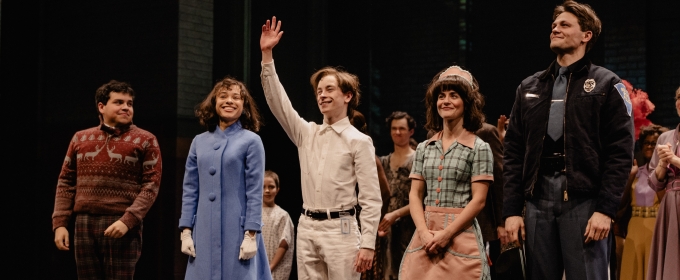 STRANGER THINGS: THE FIRST SHADOW Takes First Broadway Bows
Stranger Things: The First Shadow officially opens on Tuesday, April 22.
STRANGER THINGS: THE FIRST SHADOW Takes First Broadway Bows
Stranger Things: The First Shadow officially opens on Tuesday, April 22.
 First Look at GOOD NIGHT, AND GOOD LUCK, Starring George Clooney
Good Night, and Good Luck will open at the Winter Garden Theatre on April 3.
First Look at GOOD NIGHT, AND GOOD LUCK, Starring George Clooney
Good Night, and Good Luck will open at the Winter Garden Theatre on April 3.
 OTHELLO on Broadway Welcomes Joe and Jill Biden for A Backstage Visit
The former President and First Lady stopped in for a visit with stars Denzel Washington, Jake Gyllenhaal, and more.
OTHELLO on Broadway Welcomes Joe and Jill Biden for A Backstage Visit
The former President and First Lady stopped in for a visit with stars Denzel Washington, Jake Gyllenhaal, and more.
 THE OUTSIDERS on Broadway New Images
The current cast features Daryl Tofa as Two-Bit Mathews, Brody Grant as Ponyboy Curtis and more.
THE OUTSIDERS on Broadway New Images
The current cast features Daryl Tofa as Two-Bit Mathews, Brody Grant as Ponyboy Curtis and more.
 OTHELLO Brings Out Pres. Joe Biden, Jennifer Lopez and More on Opening Night!
Directed by Tony Award winner Kenny Leon, Othello is playing a strictly limited engagement through Sunday, June 8 only.
OTHELLO Brings Out Pres. Joe Biden, Jennifer Lopez and More on Opening Night!
Directed by Tony Award winner Kenny Leon, Othello is playing a strictly limited engagement through Sunday, June 8 only.
 STRANGER THINGS: THE FIRST SHADOW Takes First Broadway Bows
Stranger Things: The First Shadow officially opens on Tuesday, April 22.
STRANGER THINGS: THE FIRST SHADOW Takes First Broadway Bows
Stranger Things: The First Shadow officially opens on Tuesday, April 22.
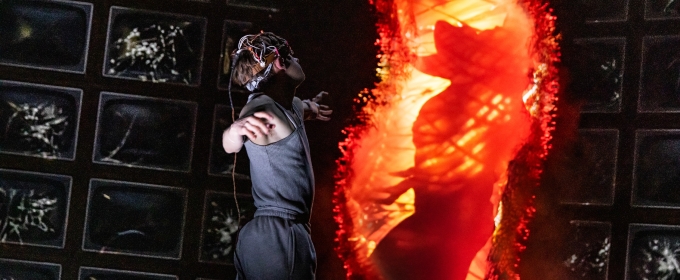 STRANGER THINGS: THE FIRST SHADOW on Broadway
Watch the trailer for the forthcoming Netflix documentary here!
STRANGER THINGS: THE FIRST SHADOW on Broadway
Watch the trailer for the forthcoming Netflix documentary here!
 OTHELLO on Broadway Welcomes Joe and Jill Biden for A Backstage Visit
The former President and First Lady stopped in for a visit with stars Denzel Washington, Jake Gyllenhaal, and more.
OTHELLO on Broadway Welcomes Joe and Jill Biden for A Backstage Visit
The former President and First Lady stopped in for a visit with stars Denzel Washington, Jake Gyllenhaal, and more.
 THE OUTSIDERS on Broadway New Images
The current cast features Daryl Tofa as Two-Bit Mathews, Brody Grant as Ponyboy Curtis and more.
THE OUTSIDERS on Broadway New Images
The current cast features Daryl Tofa as Two-Bit Mathews, Brody Grant as Ponyboy Curtis and more.
 OTHELLO Brings Out Pres. Joe Biden, Jennifer Lopez and More on Opening Night!
Directed by Tony Award winner Kenny Leon, Othello is playing a strictly limited engagement through Sunday, June 8 only.
OTHELLO Brings Out Pres. Joe Biden, Jennifer Lopez and More on Opening Night!
Directed by Tony Award winner Kenny Leon, Othello is playing a strictly limited engagement through Sunday, June 8 only.
 STRANGER THINGS: THE FIRST SHADOW Takes First Broadway Bows
Stranger Things: The First Shadow officially opens on Tuesday, April 22.
STRANGER THINGS: THE FIRST SHADOW Takes First Broadway Bows
Stranger Things: The First Shadow officially opens on Tuesday, April 22.
 STRANGER THINGS: THE FIRST SHADOW on Broadway
Watch the trailer for the forthcoming Netflix documentary here!
STRANGER THINGS: THE FIRST SHADOW on Broadway
Watch the trailer for the forthcoming Netflix documentary here!
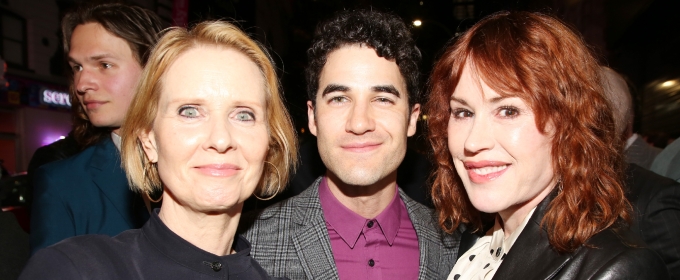 Criss, Holmes & More at GLENGARRY GLEN ROSS Opening
Performances are now underway at the Palace Theatre.
Criss, Holmes & More at GLENGARRY GLEN ROSS Opening
Performances are now underway at the Palace Theatre.
 THE OUTSIDERS on Broadway New Images
The current cast features Daryl Tofa as Two-Bit Mathews, Brody Grant as Ponyboy Curtis and more.
THE OUTSIDERS on Broadway New Images
The current cast features Daryl Tofa as Two-Bit Mathews, Brody Grant as Ponyboy Curtis and more.
 OTHELLO Brings Out Pres. Joe Biden, Jennifer Lopez and More on Opening Night!
Directed by Tony Award winner Kenny Leon, Othello is playing a strictly limited engagement through Sunday, June 8 only.
OTHELLO Brings Out Pres. Joe Biden, Jennifer Lopez and More on Opening Night!
Directed by Tony Award winner Kenny Leon, Othello is playing a strictly limited engagement through Sunday, June 8 only.
 STRANGER THINGS: THE FIRST SHADOW Takes First Broadway Bows
Stranger Things: The First Shadow officially opens on Tuesday, April 22.
STRANGER THINGS: THE FIRST SHADOW Takes First Broadway Bows
Stranger Things: The First Shadow officially opens on Tuesday, April 22.
 STRANGER THINGS: THE FIRST SHADOW on Broadway
Watch the trailer for the forthcoming Netflix documentary here!
STRANGER THINGS: THE FIRST SHADOW on Broadway
Watch the trailer for the forthcoming Netflix documentary here!
 Criss, Holmes & More at GLENGARRY GLEN ROSS Opening
Performances are now underway at the Palace Theatre.
Criss, Holmes & More at GLENGARRY GLEN ROSS Opening
Performances are now underway at the Palace Theatre.
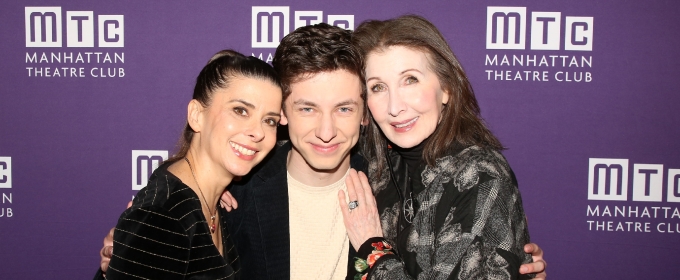 WE HAD A WORLD Celebrates Opening Night
We Had a World will run through May 11 at NY City Center Stage (ii).
WE HAD A WORLD Celebrates Opening Night
We Had a World will run through May 11 at NY City Center Stage (ii).
 OTHELLO Brings Out Pres. Joe Biden, Jennifer Lopez and More on Opening Night!
Directed by Tony Award winner Kenny Leon, Othello is playing a strictly limited engagement through Sunday, June 8 only.
OTHELLO Brings Out Pres. Joe Biden, Jennifer Lopez and More on Opening Night!
Directed by Tony Award winner Kenny Leon, Othello is playing a strictly limited engagement through Sunday, June 8 only.
 STRANGER THINGS: THE FIRST SHADOW Takes First Broadway Bows
Stranger Things: The First Shadow officially opens on Tuesday, April 22.
STRANGER THINGS: THE FIRST SHADOW Takes First Broadway Bows
Stranger Things: The First Shadow officially opens on Tuesday, April 22.
 STRANGER THINGS: THE FIRST SHADOW on Broadway
Watch the trailer for the forthcoming Netflix documentary here!
STRANGER THINGS: THE FIRST SHADOW on Broadway
Watch the trailer for the forthcoming Netflix documentary here!
 Criss, Holmes & More at GLENGARRY GLEN ROSS Opening
Performances are now underway at the Palace Theatre.
Criss, Holmes & More at GLENGARRY GLEN ROSS Opening
Performances are now underway at the Palace Theatre.
 WE HAD A WORLD Celebrates Opening Night
We Had a World will run through May 11 at NY City Center Stage (ii).
WE HAD A WORLD Celebrates Opening Night
We Had a World will run through May 11 at NY City Center Stage (ii).
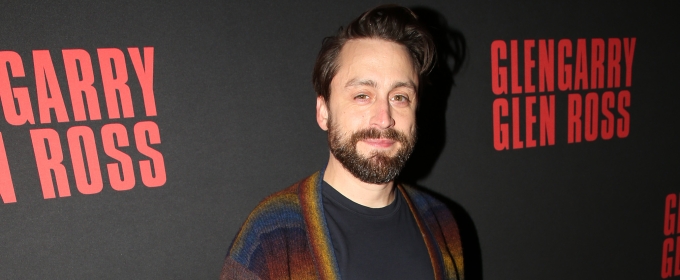 GLENGARRY GLEN ROSS Cast on the Opening Night Red Carpet
The revival officially opened on March 31 at the Palace Theatre.
GLENGARRY GLEN ROSS Cast on the Opening Night Red Carpet
The revival officially opened on March 31 at the Palace Theatre.
 STRANGER THINGS: THE FIRST SHADOW Takes First Broadway Bows
Stranger Things: The First Shadow officially opens on Tuesday, April 22.
STRANGER THINGS: THE FIRST SHADOW Takes First Broadway Bows
Stranger Things: The First Shadow officially opens on Tuesday, April 22.
 STRANGER THINGS: THE FIRST SHADOW on Broadway
Watch the trailer for the forthcoming Netflix documentary here!
STRANGER THINGS: THE FIRST SHADOW on Broadway
Watch the trailer for the forthcoming Netflix documentary here!
 Criss, Holmes & More at GLENGARRY GLEN ROSS Opening
Performances are now underway at the Palace Theatre.
Criss, Holmes & More at GLENGARRY GLEN ROSS Opening
Performances are now underway at the Palace Theatre.
 WE HAD A WORLD Celebrates Opening Night
We Had a World will run through May 11 at NY City Center Stage (ii).
WE HAD A WORLD Celebrates Opening Night
We Had a World will run through May 11 at NY City Center Stage (ii).
 GLENGARRY GLEN ROSS Cast on the Opening Night Red Carpet
The revival officially opened on March 31 at the Palace Theatre.
GLENGARRY GLEN ROSS Cast on the Opening Night Red Carpet
The revival officially opened on March 31 at the Palace Theatre.
 SIX Welcomes New Cast and Releases New Block of Tickets
Tickets are now available through November 23, 2025.
SIX Welcomes New Cast and Releases New Block of Tickets
Tickets are now available through November 23, 2025.
 STRANGER THINGS: THE FIRST SHADOW on Broadway
Watch the trailer for the forthcoming Netflix documentary here!
STRANGER THINGS: THE FIRST SHADOW on Broadway
Watch the trailer for the forthcoming Netflix documentary here!
 Criss, Holmes & More at GLENGARRY GLEN ROSS Opening
Performances are now underway at the Palace Theatre.
Criss, Holmes & More at GLENGARRY GLEN ROSS Opening
Performances are now underway at the Palace Theatre.
 WE HAD A WORLD Celebrates Opening Night
We Had a World will run through May 11 at NY City Center Stage (ii).
WE HAD A WORLD Celebrates Opening Night
We Had a World will run through May 11 at NY City Center Stage (ii).
 GLENGARRY GLEN ROSS Cast on the Opening Night Red Carpet
The revival officially opened on March 31 at the Palace Theatre.
GLENGARRY GLEN ROSS Cast on the Opening Night Red Carpet
The revival officially opened on March 31 at the Palace Theatre.
 SIX Welcomes New Cast and Releases New Block of Tickets
Tickets are now available through November 23, 2025.
SIX Welcomes New Cast and Releases New Block of Tickets
Tickets are now available through November 23, 2025.
 THE PICTURE OF DORIAN GRAY Opening Night Bows
Emmy and Olivier Award winner Sarah Snook leads the new adaptation, which is written and directed by Kip Williams.
THE PICTURE OF DORIAN GRAY Opening Night Bows
Emmy and Olivier Award winner Sarah Snook leads the new adaptation, which is written and directed by Kip Williams.
 Criss, Holmes & More at GLENGARRY GLEN ROSS Opening
Performances are now underway at the Palace Theatre.
Criss, Holmes & More at GLENGARRY GLEN ROSS Opening
Performances are now underway at the Palace Theatre.
 WE HAD A WORLD Celebrates Opening Night
We Had a World will run through May 11 at NY City Center Stage (ii).
WE HAD A WORLD Celebrates Opening Night
We Had a World will run through May 11 at NY City Center Stage (ii).
 GLENGARRY GLEN ROSS Cast on the Opening Night Red Carpet
The revival officially opened on March 31 at the Palace Theatre.
GLENGARRY GLEN ROSS Cast on the Opening Night Red Carpet
The revival officially opened on March 31 at the Palace Theatre.
 SIX Welcomes New Cast and Releases New Block of Tickets
Tickets are now available through November 23, 2025.
SIX Welcomes New Cast and Releases New Block of Tickets
Tickets are now available through November 23, 2025.
 THE PICTURE OF DORIAN GRAY Opening Night Bows
Emmy and Olivier Award winner Sarah Snook leads the new adaptation, which is written and directed by Kip Williams.
THE PICTURE OF DORIAN GRAY Opening Night Bows
Emmy and Olivier Award winner Sarah Snook leads the new adaptation, which is written and directed by Kip Williams.
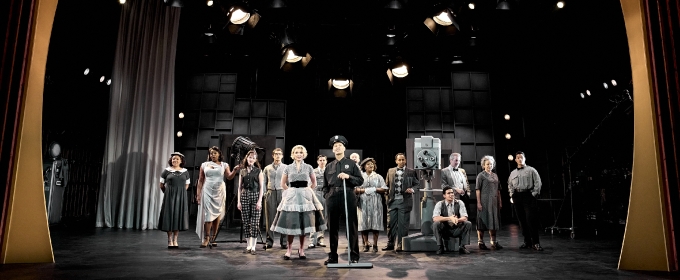 First Look at John Doyle's ALFRED HITCHCOCK PRESENTS Musical
Performances will run from 22 March to 12 April 2025.
First Look at John Doyle's ALFRED HITCHCOCK PRESENTS Musical
Performances will run from 22 March to 12 April 2025.
 WE HAD A WORLD Celebrates Opening Night
We Had a World will run through May 11 at NY City Center Stage (ii).
WE HAD A WORLD Celebrates Opening Night
We Had a World will run through May 11 at NY City Center Stage (ii).
 GLENGARRY GLEN ROSS Cast on the Opening Night Red Carpet
The revival officially opened on March 31 at the Palace Theatre.
GLENGARRY GLEN ROSS Cast on the Opening Night Red Carpet
The revival officially opened on March 31 at the Palace Theatre.
 SIX Welcomes New Cast and Releases New Block of Tickets
Tickets are now available through November 23, 2025.
SIX Welcomes New Cast and Releases New Block of Tickets
Tickets are now available through November 23, 2025.
 THE PICTURE OF DORIAN GRAY Opening Night Bows
Emmy and Olivier Award winner Sarah Snook leads the new adaptation, which is written and directed by Kip Williams.
THE PICTURE OF DORIAN GRAY Opening Night Bows
Emmy and Olivier Award winner Sarah Snook leads the new adaptation, which is written and directed by Kip Williams.
 First Look at John Doyle's ALFRED HITCHCOCK PRESENTS Musical
Performances will run from 22 March to 12 April 2025.
First Look at John Doyle's ALFRED HITCHCOCK PRESENTS Musical
Performances will run from 22 March to 12 April 2025.
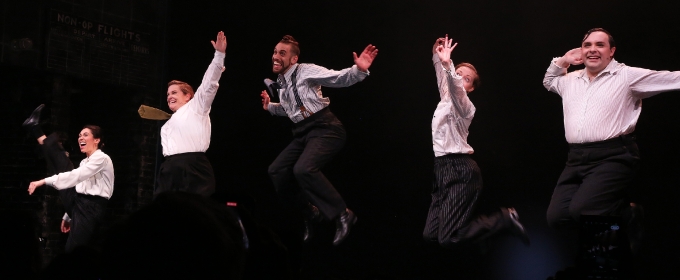 OPERATION MINCEMEAT Cast Takes Opening Night Bows on Broadway
Directed by Robert Hastie, Operation Mincemeat stars David Cumming, Claire-Marie Hall, Natasha Hodgson, and Olivier Award-winner Jak Malone and Zoë Roberts.
OPERATION MINCEMEAT Cast Takes Opening Night Bows on Broadway
Directed by Robert Hastie, Operation Mincemeat stars David Cumming, Claire-Marie Hall, Natasha Hodgson, and Olivier Award-winner Jak Malone and Zoë Roberts.
 GLENGARRY GLEN ROSS Cast on the Opening Night Red Carpet
The revival officially opened on March 31 at the Palace Theatre.
GLENGARRY GLEN ROSS Cast on the Opening Night Red Carpet
The revival officially opened on March 31 at the Palace Theatre.
 SIX Welcomes New Cast and Releases New Block of Tickets
Tickets are now available through November 23, 2025.
SIX Welcomes New Cast and Releases New Block of Tickets
Tickets are now available through November 23, 2025.
 THE PICTURE OF DORIAN GRAY Opening Night Bows
Emmy and Olivier Award winner Sarah Snook leads the new adaptation, which is written and directed by Kip Williams.
THE PICTURE OF DORIAN GRAY Opening Night Bows
Emmy and Olivier Award winner Sarah Snook leads the new adaptation, which is written and directed by Kip Williams.
 First Look at John Doyle's ALFRED HITCHCOCK PRESENTS Musical
Performances will run from 22 March to 12 April 2025.
First Look at John Doyle's ALFRED HITCHCOCK PRESENTS Musical
Performances will run from 22 March to 12 April 2025.
 OPERATION MINCEMEAT Cast Takes Opening Night Bows on Broadway
Directed by Robert Hastie, Operation Mincemeat stars David Cumming, Claire-Marie Hall, Natasha Hodgson, and Olivier Award-winner Jak Malone and Zoë Roberts.
OPERATION MINCEMEAT Cast Takes Opening Night Bows on Broadway
Directed by Robert Hastie, Operation Mincemeat stars David Cumming, Claire-Marie Hall, Natasha Hodgson, and Olivier Award-winner Jak Malone and Zoë Roberts.
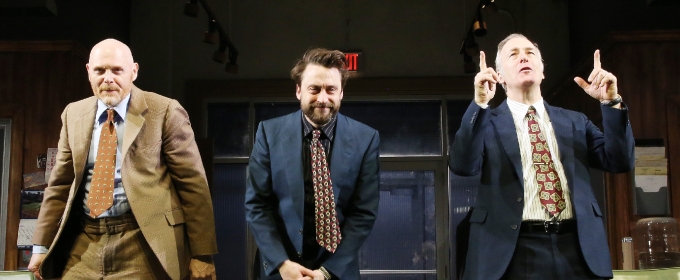 GLENGARRY GLEN ROSS Cast Takes Opening Night Bows
Performances are now underway at the Palace Theatre.
GLENGARRY GLEN ROSS Cast Takes Opening Night Bows
Performances are now underway at the Palace Theatre.
 SIX Welcomes New Cast and Releases New Block of Tickets
Tickets are now available through November 23, 2025.
SIX Welcomes New Cast and Releases New Block of Tickets
Tickets are now available through November 23, 2025.
 THE PICTURE OF DORIAN GRAY Opening Night Bows
Emmy and Olivier Award winner Sarah Snook leads the new adaptation, which is written and directed by Kip Williams.
THE PICTURE OF DORIAN GRAY Opening Night Bows
Emmy and Olivier Award winner Sarah Snook leads the new adaptation, which is written and directed by Kip Williams.
 First Look at John Doyle's ALFRED HITCHCOCK PRESENTS Musical
Performances will run from 22 March to 12 April 2025.
First Look at John Doyle's ALFRED HITCHCOCK PRESENTS Musical
Performances will run from 22 March to 12 April 2025.
 OPERATION MINCEMEAT Cast Takes Opening Night Bows on Broadway
Directed by Robert Hastie, Operation Mincemeat stars David Cumming, Claire-Marie Hall, Natasha Hodgson, and Olivier Award-winner Jak Malone and Zoë Roberts.
OPERATION MINCEMEAT Cast Takes Opening Night Bows on Broadway
Directed by Robert Hastie, Operation Mincemeat stars David Cumming, Claire-Marie Hall, Natasha Hodgson, and Olivier Award-winner Jak Malone and Zoë Roberts.
 GLENGARRY GLEN ROSS Cast Takes Opening Night Bows
Performances are now underway at the Palace Theatre.
GLENGARRY GLEN ROSS Cast Takes Opening Night Bows
Performances are now underway at the Palace Theatre.
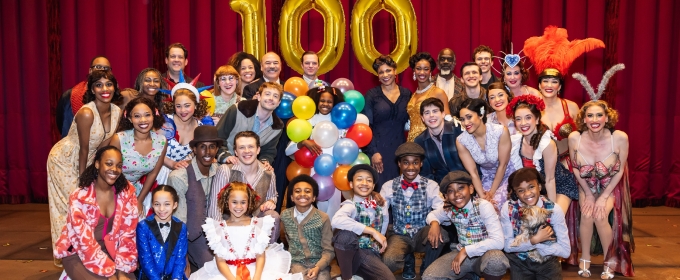 Photo: GYPSY Celebrates 100th Broadway Performance
Gypsy stars Audra McDonald, Joy Woods, Danny Burstein, and Jordan Tyson.
Photo: GYPSY Celebrates 100th Broadway Performance
Gypsy stars Audra McDonald, Joy Woods, Danny Burstein, and Jordan Tyson.
 THE PICTURE OF DORIAN GRAY Opening Night Bows
Emmy and Olivier Award winner Sarah Snook leads the new adaptation, which is written and directed by Kip Williams.
THE PICTURE OF DORIAN GRAY Opening Night Bows
Emmy and Olivier Award winner Sarah Snook leads the new adaptation, which is written and directed by Kip Williams.
 First Look at John Doyle's ALFRED HITCHCOCK PRESENTS Musical
Performances will run from 22 March to 12 April 2025.
First Look at John Doyle's ALFRED HITCHCOCK PRESENTS Musical
Performances will run from 22 March to 12 April 2025.
 OPERATION MINCEMEAT Cast Takes Opening Night Bows on Broadway
Directed by Robert Hastie, Operation Mincemeat stars David Cumming, Claire-Marie Hall, Natasha Hodgson, and Olivier Award-winner Jak Malone and Zoë Roberts.
OPERATION MINCEMEAT Cast Takes Opening Night Bows on Broadway
Directed by Robert Hastie, Operation Mincemeat stars David Cumming, Claire-Marie Hall, Natasha Hodgson, and Olivier Award-winner Jak Malone and Zoë Roberts.
 GLENGARRY GLEN ROSS Cast Takes Opening Night Bows
Performances are now underway at the Palace Theatre.
GLENGARRY GLEN ROSS Cast Takes Opening Night Bows
Performances are now underway at the Palace Theatre.
 Photo: GYPSY Celebrates 100th Broadway Performance
Gypsy stars Audra McDonald, Joy Woods, Danny Burstein, and Jordan Tyson.
Photo: GYPSY Celebrates 100th Broadway Performance
Gypsy stars Audra McDonald, Joy Woods, Danny Burstein, and Jordan Tyson.
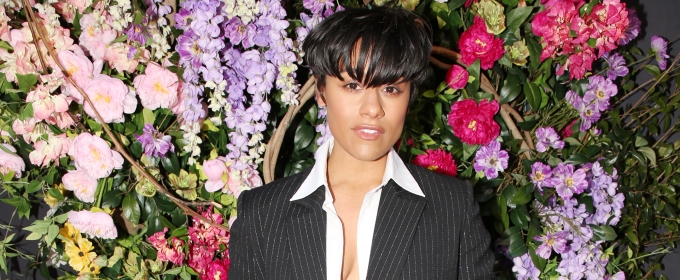 THE PICTURE OF DORIAN GRAY Opening Night Pink Carpet
Performances are now underway at the Music Box Theatre.
THE PICTURE OF DORIAN GRAY Opening Night Pink Carpet
Performances are now underway at the Music Box Theatre.
 First Look at John Doyle's ALFRED HITCHCOCK PRESENTS Musical
Performances will run from 22 March to 12 April 2025.
First Look at John Doyle's ALFRED HITCHCOCK PRESENTS Musical
Performances will run from 22 March to 12 April 2025.
 OPERATION MINCEMEAT Cast Takes Opening Night Bows on Broadway
Directed by Robert Hastie, Operation Mincemeat stars David Cumming, Claire-Marie Hall, Natasha Hodgson, and Olivier Award-winner Jak Malone and Zoë Roberts.
OPERATION MINCEMEAT Cast Takes Opening Night Bows on Broadway
Directed by Robert Hastie, Operation Mincemeat stars David Cumming, Claire-Marie Hall, Natasha Hodgson, and Olivier Award-winner Jak Malone and Zoë Roberts.
 GLENGARRY GLEN ROSS Cast Takes Opening Night Bows
Performances are now underway at the Palace Theatre.
GLENGARRY GLEN ROSS Cast Takes Opening Night Bows
Performances are now underway at the Palace Theatre.
 Photo: GYPSY Celebrates 100th Broadway Performance
Gypsy stars Audra McDonald, Joy Woods, Danny Burstein, and Jordan Tyson.
Photo: GYPSY Celebrates 100th Broadway Performance
Gypsy stars Audra McDonald, Joy Woods, Danny Burstein, and Jordan Tyson.
 THE PICTURE OF DORIAN GRAY Opening Night Pink Carpet
Performances are now underway at the Music Box Theatre.
THE PICTURE OF DORIAN GRAY Opening Night Pink Carpet
Performances are now underway at the Music Box Theatre.
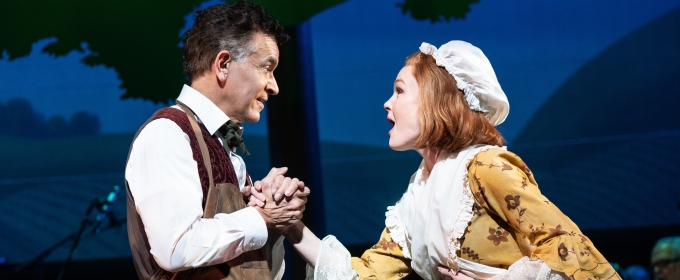 Encores! LOVE LIFE, Starring Brian Stokes Mitchell and Kate Baldwin
Love Life will run through March 30 at New York City Center.
Encores! LOVE LIFE, Starring Brian Stokes Mitchell and Kate Baldwin
Love Life will run through March 30 at New York City Center.
 OPERATION MINCEMEAT Cast Takes Opening Night Bows on Broadway
Directed by Robert Hastie, Operation Mincemeat stars David Cumming, Claire-Marie Hall, Natasha Hodgson, and Olivier Award-winner Jak Malone and Zoë Roberts.
OPERATION MINCEMEAT Cast Takes Opening Night Bows on Broadway
Directed by Robert Hastie, Operation Mincemeat stars David Cumming, Claire-Marie Hall, Natasha Hodgson, and Olivier Award-winner Jak Malone and Zoë Roberts.
 GLENGARRY GLEN ROSS Cast Takes Opening Night Bows
Performances are now underway at the Palace Theatre.
GLENGARRY GLEN ROSS Cast Takes Opening Night Bows
Performances are now underway at the Palace Theatre.
 Photo: GYPSY Celebrates 100th Broadway Performance
Gypsy stars Audra McDonald, Joy Woods, Danny Burstein, and Jordan Tyson.
Photo: GYPSY Celebrates 100th Broadway Performance
Gypsy stars Audra McDonald, Joy Woods, Danny Burstein, and Jordan Tyson.
 THE PICTURE OF DORIAN GRAY Opening Night Pink Carpet
Performances are now underway at the Music Box Theatre.
THE PICTURE OF DORIAN GRAY Opening Night Pink Carpet
Performances are now underway at the Music Box Theatre.
 Encores! LOVE LIFE, Starring Brian Stokes Mitchell and Kate Baldwin
Love Life will run through March 30 at New York City Center.
Encores! LOVE LIFE, Starring Brian Stokes Mitchell and Kate Baldwin
Love Life will run through March 30 at New York City Center.
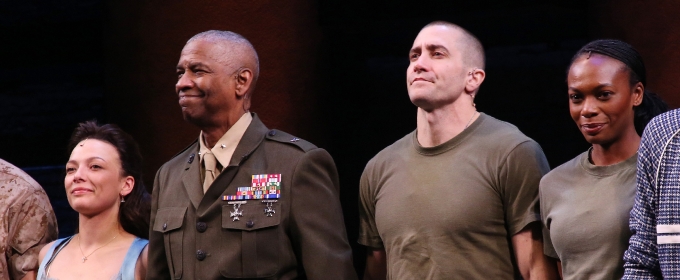 Denzel Washington and Jake Gyllenhaal at OTHELLO Curtain Call
Joining Washington and Gyllenhaal are Molly Osborne as ‘Desdemona’, Tony Award winner Andrew Burnap as ‘Cassio’, and more.
Denzel Washington and Jake Gyllenhaal at OTHELLO Curtain Call
Joining Washington and Gyllenhaal are Molly Osborne as ‘Desdemona’, Tony Award winner Andrew Burnap as ‘Cassio’, and more.
 GLENGARRY GLEN ROSS Cast Takes Opening Night Bows
Performances are now underway at the Palace Theatre.
GLENGARRY GLEN ROSS Cast Takes Opening Night Bows
Performances are now underway at the Palace Theatre.
 Photo: GYPSY Celebrates 100th Broadway Performance
Gypsy stars Audra McDonald, Joy Woods, Danny Burstein, and Jordan Tyson.
Photo: GYPSY Celebrates 100th Broadway Performance
Gypsy stars Audra McDonald, Joy Woods, Danny Burstein, and Jordan Tyson.
 THE PICTURE OF DORIAN GRAY Opening Night Pink Carpet
Performances are now underway at the Music Box Theatre.
THE PICTURE OF DORIAN GRAY Opening Night Pink Carpet
Performances are now underway at the Music Box Theatre.
 Encores! LOVE LIFE, Starring Brian Stokes Mitchell and Kate Baldwin
Love Life will run through March 30 at New York City Center.
Encores! LOVE LIFE, Starring Brian Stokes Mitchell and Kate Baldwin
Love Life will run through March 30 at New York City Center.
 Denzel Washington and Jake Gyllenhaal at OTHELLO Curtain Call
Joining Washington and Gyllenhaal are Molly Osborne as ‘Desdemona’, Tony Award winner Andrew Burnap as ‘Cassio’, and more.
Denzel Washington and Jake Gyllenhaal at OTHELLO Curtain Call
Joining Washington and Gyllenhaal are Molly Osborne as ‘Desdemona’, Tony Award winner Andrew Burnap as ‘Cassio’, and more.
 Jason Robert Brown, Lin-Manuel Miranda & More Sign Albums at Drama Book Shop
'Jason Robert Brown and Stephen Sondheim: Live in Concert' is now available on vinyl.
Jason Robert Brown, Lin-Manuel Miranda & More Sign Albums at Drama Book Shop
'Jason Robert Brown and Stephen Sondheim: Live in Concert' is now available on vinyl.
 Photo: GYPSY Celebrates 100th Broadway Performance
Gypsy stars Audra McDonald, Joy Woods, Danny Burstein, and Jordan Tyson.
Photo: GYPSY Celebrates 100th Broadway Performance
Gypsy stars Audra McDonald, Joy Woods, Danny Burstein, and Jordan Tyson.
 THE PICTURE OF DORIAN GRAY Opening Night Pink Carpet
Performances are now underway at the Music Box Theatre.
THE PICTURE OF DORIAN GRAY Opening Night Pink Carpet
Performances are now underway at the Music Box Theatre.
 Encores! LOVE LIFE, Starring Brian Stokes Mitchell and Kate Baldwin
Love Life will run through March 30 at New York City Center.
Encores! LOVE LIFE, Starring Brian Stokes Mitchell and Kate Baldwin
Love Life will run through March 30 at New York City Center.
 Denzel Washington and Jake Gyllenhaal at OTHELLO Curtain Call
Joining Washington and Gyllenhaal are Molly Osborne as ‘Desdemona’, Tony Award winner Andrew Burnap as ‘Cassio’, and more.
Denzel Washington and Jake Gyllenhaal at OTHELLO Curtain Call
Joining Washington and Gyllenhaal are Molly Osborne as ‘Desdemona’, Tony Award winner Andrew Burnap as ‘Cassio’, and more.
 Jason Robert Brown, Lin-Manuel Miranda & More Sign Albums at Drama Book Shop
'Jason Robert Brown and Stephen Sondheim: Live in Concert' is now available on vinyl.
Jason Robert Brown, Lin-Manuel Miranda & More Sign Albums at Drama Book Shop
'Jason Robert Brown and Stephen Sondheim: Live in Concert' is now available on vinyl.
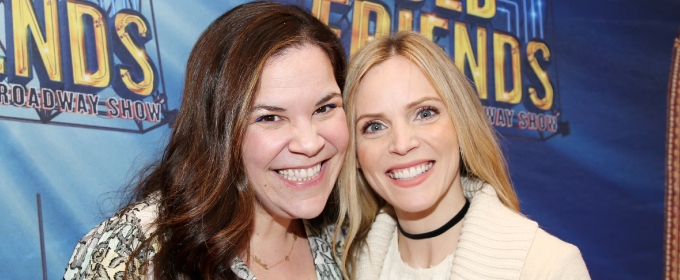 STEPHEN SONDHEIM'S OLD FRIENDS Hosts Benefit Performance
Stephen Sondheim’s Old Friends will officially open on Broadway on April 8, 2025.
STEPHEN SONDHEIM'S OLD FRIENDS Hosts Benefit Performance
Stephen Sondheim’s Old Friends will officially open on Broadway on April 8, 2025.
 THE PICTURE OF DORIAN GRAY Opening Night Pink Carpet
Performances are now underway at the Music Box Theatre.
THE PICTURE OF DORIAN GRAY Opening Night Pink Carpet
Performances are now underway at the Music Box Theatre.
 Encores! LOVE LIFE, Starring Brian Stokes Mitchell and Kate Baldwin
Love Life will run through March 30 at New York City Center.
Encores! LOVE LIFE, Starring Brian Stokes Mitchell and Kate Baldwin
Love Life will run through March 30 at New York City Center.
 Denzel Washington and Jake Gyllenhaal at OTHELLO Curtain Call
Joining Washington and Gyllenhaal are Molly Osborne as ‘Desdemona’, Tony Award winner Andrew Burnap as ‘Cassio’, and more.
Denzel Washington and Jake Gyllenhaal at OTHELLO Curtain Call
Joining Washington and Gyllenhaal are Molly Osborne as ‘Desdemona’, Tony Award winner Andrew Burnap as ‘Cassio’, and more.
 Jason Robert Brown, Lin-Manuel Miranda & More Sign Albums at Drama Book Shop
'Jason Robert Brown and Stephen Sondheim: Live in Concert' is now available on vinyl.
Jason Robert Brown, Lin-Manuel Miranda & More Sign Albums at Drama Book Shop
'Jason Robert Brown and Stephen Sondheim: Live in Concert' is now available on vinyl.
 STEPHEN SONDHEIM'S OLD FRIENDS Hosts Benefit Performance
Stephen Sondheim’s Old Friends will officially open on Broadway on April 8, 2025.
STEPHEN SONDHEIM'S OLD FRIENDS Hosts Benefit Performance
Stephen Sondheim’s Old Friends will officially open on Broadway on April 8, 2025.
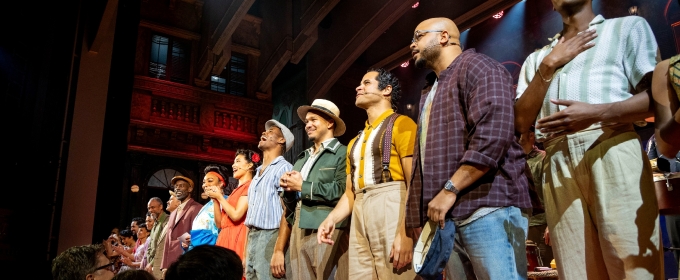 BUENA VISTA SOCIAL CLUB Takes Opening Night Bows
Buena Vista Social Club is now running on Broadway at the Schoenfeld Theatre.
BUENA VISTA SOCIAL CLUB Takes Opening Night Bows
Buena Vista Social Club is now running on Broadway at the Schoenfeld Theatre.
 Encores! LOVE LIFE, Starring Brian Stokes Mitchell and Kate Baldwin
Love Life will run through March 30 at New York City Center.
Encores! LOVE LIFE, Starring Brian Stokes Mitchell and Kate Baldwin
Love Life will run through March 30 at New York City Center.
 Denzel Washington and Jake Gyllenhaal at OTHELLO Curtain Call
Joining Washington and Gyllenhaal are Molly Osborne as ‘Desdemona’, Tony Award winner Andrew Burnap as ‘Cassio’, and more.
Denzel Washington and Jake Gyllenhaal at OTHELLO Curtain Call
Joining Washington and Gyllenhaal are Molly Osborne as ‘Desdemona’, Tony Award winner Andrew Burnap as ‘Cassio’, and more.
 Jason Robert Brown, Lin-Manuel Miranda & More Sign Albums at Drama Book Shop
'Jason Robert Brown and Stephen Sondheim: Live in Concert' is now available on vinyl.
Jason Robert Brown, Lin-Manuel Miranda & More Sign Albums at Drama Book Shop
'Jason Robert Brown and Stephen Sondheim: Live in Concert' is now available on vinyl.
 STEPHEN SONDHEIM'S OLD FRIENDS Hosts Benefit Performance
Stephen Sondheim’s Old Friends will officially open on Broadway on April 8, 2025.
STEPHEN SONDHEIM'S OLD FRIENDS Hosts Benefit Performance
Stephen Sondheim’s Old Friends will officially open on Broadway on April 8, 2025.
 BUENA VISTA SOCIAL CLUB Takes Opening Night Bows
Buena Vista Social Club is now running on Broadway at the Schoenfeld Theatre.
BUENA VISTA SOCIAL CLUB Takes Opening Night Bows
Buena Vista Social Club is now running on Broadway at the Schoenfeld Theatre.
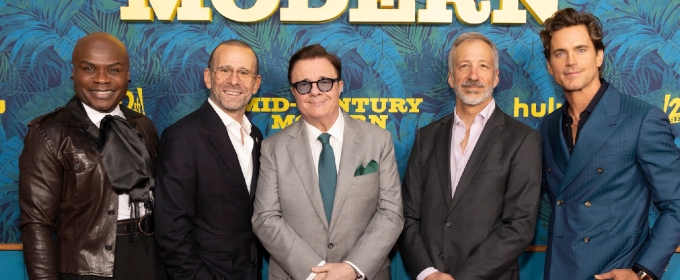 Hulu's MID-CENTURY MODERN Premieres In Los Angeles
The series premieres March 28, 2025 with all ten episodes on Hulu.
Hulu's MID-CENTURY MODERN Premieres In Los Angeles
The series premieres March 28, 2025 with all ten episodes on Hulu.
 Denzel Washington and Jake Gyllenhaal at OTHELLO Curtain Call
Joining Washington and Gyllenhaal are Molly Osborne as ‘Desdemona’, Tony Award winner Andrew Burnap as ‘Cassio’, and more.
Denzel Washington and Jake Gyllenhaal at OTHELLO Curtain Call
Joining Washington and Gyllenhaal are Molly Osborne as ‘Desdemona’, Tony Award winner Andrew Burnap as ‘Cassio’, and more.
 Jason Robert Brown, Lin-Manuel Miranda & More Sign Albums at Drama Book Shop
'Jason Robert Brown and Stephen Sondheim: Live in Concert' is now available on vinyl.
Jason Robert Brown, Lin-Manuel Miranda & More Sign Albums at Drama Book Shop
'Jason Robert Brown and Stephen Sondheim: Live in Concert' is now available on vinyl.
 STEPHEN SONDHEIM'S OLD FRIENDS Hosts Benefit Performance
Stephen Sondheim’s Old Friends will officially open on Broadway on April 8, 2025.
STEPHEN SONDHEIM'S OLD FRIENDS Hosts Benefit Performance
Stephen Sondheim’s Old Friends will officially open on Broadway on April 8, 2025.
 BUENA VISTA SOCIAL CLUB Takes Opening Night Bows
Buena Vista Social Club is now running on Broadway at the Schoenfeld Theatre.
BUENA VISTA SOCIAL CLUB Takes Opening Night Bows
Buena Vista Social Club is now running on Broadway at the Schoenfeld Theatre.
 Hulu's MID-CENTURY MODERN Premieres In Los Angeles
The series premieres March 28, 2025 with all ten episodes on Hulu.
Hulu's MID-CENTURY MODERN Premieres In Los Angeles
The series premieres March 28, 2025 with all ten episodes on Hulu.
 Inside the DEAD OUTLAW Launch Party at Bowery Ballroom
David Yazbek emceed the event, which featured performances from the cast including Andrew Durand, Jeb Brown, and more.
Inside the DEAD OUTLAW Launch Party at Bowery Ballroom
David Yazbek emceed the event, which featured performances from the cast including Andrew Durand, Jeb Brown, and more.
 Jason Robert Brown, Lin-Manuel Miranda & More Sign Albums at Drama Book Shop
'Jason Robert Brown and Stephen Sondheim: Live in Concert' is now available on vinyl.
Jason Robert Brown, Lin-Manuel Miranda & More Sign Albums at Drama Book Shop
'Jason Robert Brown and Stephen Sondheim: Live in Concert' is now available on vinyl.
 STEPHEN SONDHEIM'S OLD FRIENDS Hosts Benefit Performance
Stephen Sondheim’s Old Friends will officially open on Broadway on April 8, 2025.
STEPHEN SONDHEIM'S OLD FRIENDS Hosts Benefit Performance
Stephen Sondheim’s Old Friends will officially open on Broadway on April 8, 2025.
 BUENA VISTA SOCIAL CLUB Takes Opening Night Bows
Buena Vista Social Club is now running on Broadway at the Schoenfeld Theatre.
BUENA VISTA SOCIAL CLUB Takes Opening Night Bows
Buena Vista Social Club is now running on Broadway at the Schoenfeld Theatre.
 Hulu's MID-CENTURY MODERN Premieres In Los Angeles
The series premieres March 28, 2025 with all ten episodes on Hulu.
Hulu's MID-CENTURY MODERN Premieres In Los Angeles
The series premieres March 28, 2025 with all ten episodes on Hulu.
 Inside the DEAD OUTLAW Launch Party at Bowery Ballroom
David Yazbek emceed the event, which featured performances from the cast including Andrew Durand, Jeb Brown, and more.
Inside the DEAD OUTLAW Launch Party at Bowery Ballroom
David Yazbek emceed the event, which featured performances from the cast including Andrew Durand, Jeb Brown, and more.
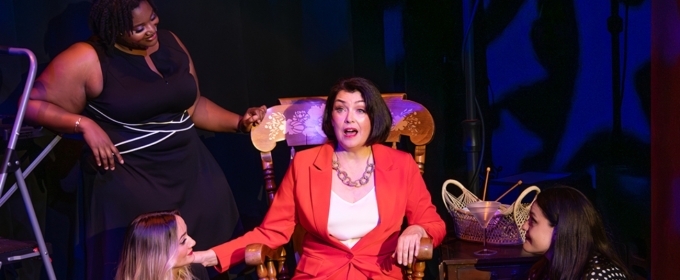 RESPECT at Pompano Beach Cultural Center
The show runs March 28 through April 6, 2025.
RESPECT at Pompano Beach Cultural Center
The show runs March 28 through April 6, 2025.
 STEPHEN SONDHEIM'S OLD FRIENDS Hosts Benefit Performance
Stephen Sondheim’s Old Friends will officially open on Broadway on April 8, 2025.
STEPHEN SONDHEIM'S OLD FRIENDS Hosts Benefit Performance
Stephen Sondheim’s Old Friends will officially open on Broadway on April 8, 2025.
 BUENA VISTA SOCIAL CLUB Takes Opening Night Bows
Buena Vista Social Club is now running on Broadway at the Schoenfeld Theatre.
BUENA VISTA SOCIAL CLUB Takes Opening Night Bows
Buena Vista Social Club is now running on Broadway at the Schoenfeld Theatre.
 Hulu's MID-CENTURY MODERN Premieres In Los Angeles
The series premieres March 28, 2025 with all ten episodes on Hulu.
Hulu's MID-CENTURY MODERN Premieres In Los Angeles
The series premieres March 28, 2025 with all ten episodes on Hulu.
 Inside the DEAD OUTLAW Launch Party at Bowery Ballroom
David Yazbek emceed the event, which featured performances from the cast including Andrew Durand, Jeb Brown, and more.
Inside the DEAD OUTLAW Launch Party at Bowery Ballroom
David Yazbek emceed the event, which featured performances from the cast including Andrew Durand, Jeb Brown, and more.
 RESPECT at Pompano Beach Cultural Center
The show runs March 28 through April 6, 2025.
RESPECT at Pompano Beach Cultural Center
The show runs March 28 through April 6, 2025.
 First Look At Orville Peck and Eva Noblezada In CABARET AT THE KIT KAT CLUB
Peck and Noblezada will star in the Tony Award-winning production for a limited 16-week engagement through Sunday, July 20.
First Look At Orville Peck and Eva Noblezada In CABARET AT THE KIT KAT CLUB
Peck and Noblezada will star in the Tony Award-winning production for a limited 16-week engagement through Sunday, July 20.
 BUENA VISTA SOCIAL CLUB Takes Opening Night Bows
Buena Vista Social Club is now running on Broadway at the Schoenfeld Theatre.
BUENA VISTA SOCIAL CLUB Takes Opening Night Bows
Buena Vista Social Club is now running on Broadway at the Schoenfeld Theatre.
 Hulu's MID-CENTURY MODERN Premieres In Los Angeles
The series premieres March 28, 2025 with all ten episodes on Hulu.
Hulu's MID-CENTURY MODERN Premieres In Los Angeles
The series premieres March 28, 2025 with all ten episodes on Hulu.
 Inside the DEAD OUTLAW Launch Party at Bowery Ballroom
David Yazbek emceed the event, which featured performances from the cast including Andrew Durand, Jeb Brown, and more.
Inside the DEAD OUTLAW Launch Party at Bowery Ballroom
David Yazbek emceed the event, which featured performances from the cast including Andrew Durand, Jeb Brown, and more.
 RESPECT at Pompano Beach Cultural Center
The show runs March 28 through April 6, 2025.
RESPECT at Pompano Beach Cultural Center
The show runs March 28 through April 6, 2025.
 First Look At Orville Peck and Eva Noblezada In CABARET AT THE KIT KAT CLUB
Peck and Noblezada will star in the Tony Award-winning production for a limited 16-week engagement through Sunday, July 20.
First Look At Orville Peck and Eva Noblezada In CABARET AT THE KIT KAT CLUB
Peck and Noblezada will star in the Tony Award-winning production for a limited 16-week engagement through Sunday, July 20.
 Exclusive: Inside THE PICTURE OF DORIAN GRAY Opening Night Party
The production opened on March 27 at the Music Box Theatre.
Exclusive: Inside THE PICTURE OF DORIAN GRAY Opening Night Party
The production opened on March 27 at the Music Box Theatre.
 Hulu's MID-CENTURY MODERN Premieres In Los Angeles
The series premieres March 28, 2025 with all ten episodes on Hulu.
Hulu's MID-CENTURY MODERN Premieres In Los Angeles
The series premieres March 28, 2025 with all ten episodes on Hulu.
 Inside the DEAD OUTLAW Launch Party at Bowery Ballroom
David Yazbek emceed the event, which featured performances from the cast including Andrew Durand, Jeb Brown, and more.
Inside the DEAD OUTLAW Launch Party at Bowery Ballroom
David Yazbek emceed the event, which featured performances from the cast including Andrew Durand, Jeb Brown, and more.
 RESPECT at Pompano Beach Cultural Center
The show runs March 28 through April 6, 2025.
RESPECT at Pompano Beach Cultural Center
The show runs March 28 through April 6, 2025.
 First Look At Orville Peck and Eva Noblezada In CABARET AT THE KIT KAT CLUB
Peck and Noblezada will star in the Tony Award-winning production for a limited 16-week engagement through Sunday, July 20.
First Look At Orville Peck and Eva Noblezada In CABARET AT THE KIT KAT CLUB
Peck and Noblezada will star in the Tony Award-winning production for a limited 16-week engagement through Sunday, July 20.
 Exclusive: Inside THE PICTURE OF DORIAN GRAY Opening Night Party
The production opened on March 27 at the Music Box Theatre.
Exclusive: Inside THE PICTURE OF DORIAN GRAY Opening Night Party
The production opened on March 27 at the Music Box Theatre.
 OTHELLO On Broadway Starring Denzel Washington and Jake Gyllenhaal
Othello will open Sunday, March 23 for a strictly limited engagement through Sunday, June 8 only at the Barrymore Theatre.
OTHELLO On Broadway Starring Denzel Washington and Jake Gyllenhaal
Othello will open Sunday, March 23 for a strictly limited engagement through Sunday, June 8 only at the Barrymore Theatre.
 Inside the DEAD OUTLAW Launch Party at Bowery Ballroom
David Yazbek emceed the event, which featured performances from the cast including Andrew Durand, Jeb Brown, and more.
Inside the DEAD OUTLAW Launch Party at Bowery Ballroom
David Yazbek emceed the event, which featured performances from the cast including Andrew Durand, Jeb Brown, and more.
 RESPECT at Pompano Beach Cultural Center
The show runs March 28 through April 6, 2025.
RESPECT at Pompano Beach Cultural Center
The show runs March 28 through April 6, 2025.
 First Look At Orville Peck and Eva Noblezada In CABARET AT THE KIT KAT CLUB
Peck and Noblezada will star in the Tony Award-winning production for a limited 16-week engagement through Sunday, July 20.
First Look At Orville Peck and Eva Noblezada In CABARET AT THE KIT KAT CLUB
Peck and Noblezada will star in the Tony Award-winning production for a limited 16-week engagement through Sunday, July 20.
 Exclusive: Inside THE PICTURE OF DORIAN GRAY Opening Night Party
The production opened on March 27 at the Music Box Theatre.
Exclusive: Inside THE PICTURE OF DORIAN GRAY Opening Night Party
The production opened on March 27 at the Music Box Theatre.
 OTHELLO On Broadway Starring Denzel Washington and Jake Gyllenhaal
Othello will open Sunday, March 23 for a strictly limited engagement through Sunday, June 8 only at the Barrymore Theatre.
OTHELLO On Broadway Starring Denzel Washington and Jake Gyllenhaal
Othello will open Sunday, March 23 for a strictly limited engagement through Sunday, June 8 only at the Barrymore Theatre.
 Andrew Scott and More on the VANYA Red Carpet
See photos of Antoni Porowski, Cole Escola, Noah Galvin and Ben Platt and more.
Andrew Scott and More on the VANYA Red Carpet
See photos of Antoni Porowski, Cole Escola, Noah Galvin and Ben Platt and more.
 RESPECT at Pompano Beach Cultural Center
The show runs March 28 through April 6, 2025.
RESPECT at Pompano Beach Cultural Center
The show runs March 28 through April 6, 2025.
 First Look At Orville Peck and Eva Noblezada In CABARET AT THE KIT KAT CLUB
Peck and Noblezada will star in the Tony Award-winning production for a limited 16-week engagement through Sunday, July 20.
First Look At Orville Peck and Eva Noblezada In CABARET AT THE KIT KAT CLUB
Peck and Noblezada will star in the Tony Award-winning production for a limited 16-week engagement through Sunday, July 20.
 Exclusive: Inside THE PICTURE OF DORIAN GRAY Opening Night Party
The production opened on March 27 at the Music Box Theatre.
Exclusive: Inside THE PICTURE OF DORIAN GRAY Opening Night Party
The production opened on March 27 at the Music Box Theatre.
 OTHELLO On Broadway Starring Denzel Washington and Jake Gyllenhaal
Othello will open Sunday, March 23 for a strictly limited engagement through Sunday, June 8 only at the Barrymore Theatre.
OTHELLO On Broadway Starring Denzel Washington and Jake Gyllenhaal
Othello will open Sunday, March 23 for a strictly limited engagement through Sunday, June 8 only at the Barrymore Theatre.
 Andrew Scott and More on the VANYA Red Carpet
See photos of Antoni Porowski, Cole Escola, Noah Galvin and Ben Platt and more.
Andrew Scott and More on the VANYA Red Carpet
See photos of Antoni Porowski, Cole Escola, Noah Galvin and Ben Platt and more.
 Boy George Returns to MOULIN ROUGE! on Broadway
Boy George will play a limited 10-week engagement through Sunday, May 25.
Boy George Returns to MOULIN ROUGE! on Broadway
Boy George will play a limited 10-week engagement through Sunday, May 25.
Industry
Get Broadway's #1 Newsletter

West End
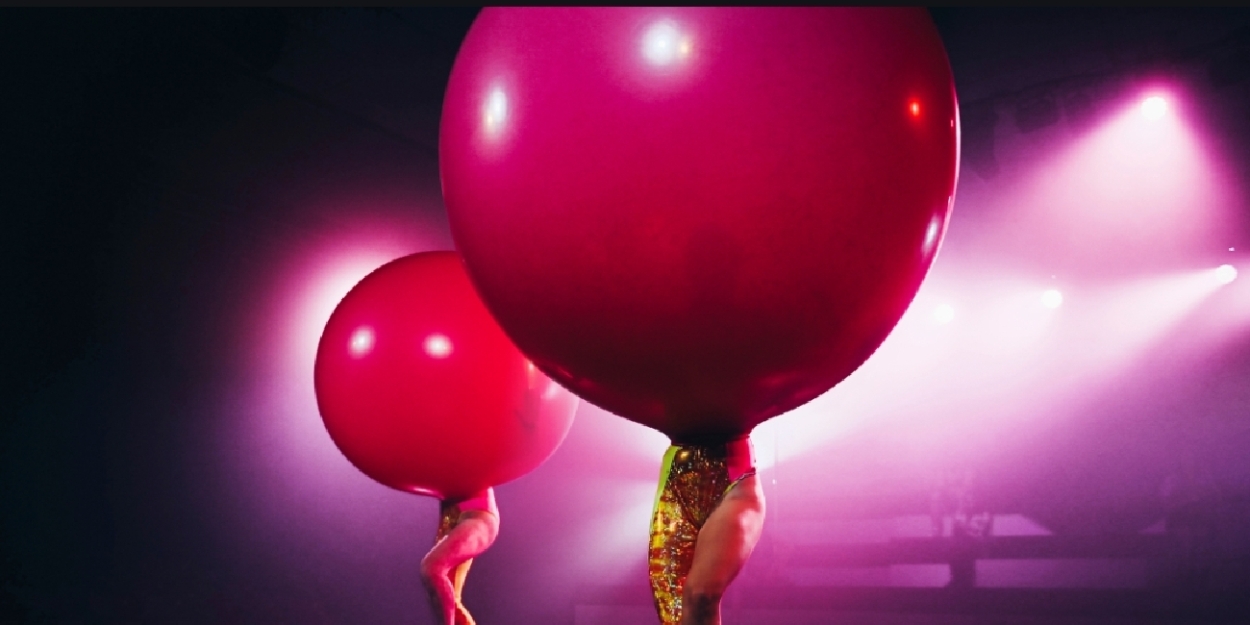
Review: WAKE - THISISPOPBABY, Peacock Theatre
They say no one does a funeral like the Irish...
They say no one does a funeral like the Irish...
New York City
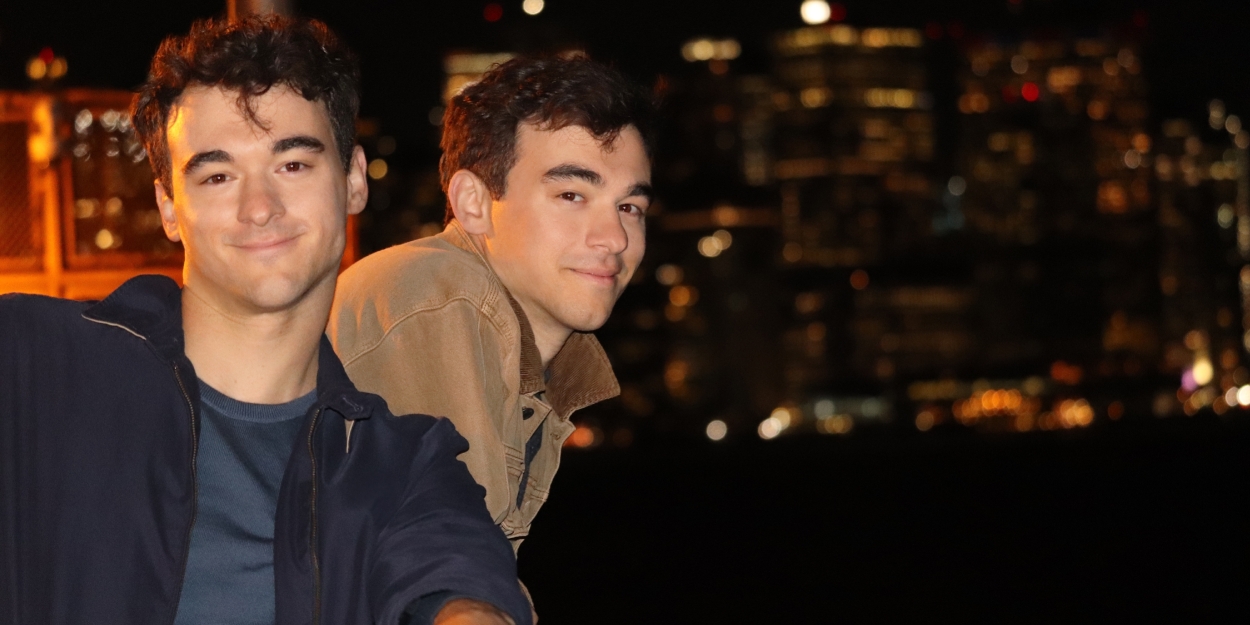
The Drinkwater Brothers Set 'An Auspicious Debut' at 54 Below with Brian Nash & Richard Jay-Alexander
The evening has pop, show tunes, classic American standards and some of their own compositions, which will be debuted on the 23rd at 7:00 P.M
The evening has pop, show tunes, classic American standards and some of their own compositions, which will be debuted on the 23rd at 7:00 P.M
United States

Photos/Video: TITANIQUE At Porchlight Music Theatre
The 2023 Lortel Award-winning musical comedy has been extended by popular demand through July 13.
The 2023 Lortel Award-winning musical comedy has been extended by popular demand through July 13.
International

Dame Maureen Lipman, Dame Felicity Lott, and More to Join Janie Dee at Crazy Coqs
The lineup includes Josephina Ortiz-Lewis, Wayne Sleep OBE and more.
The lineup includes Josephina Ortiz-Lewis, Wayne Sleep OBE and more.

